Basketball officially enters the Paul Mills era
BY MELANIE RIVERA-CORTEZ sports@thesunflower.com
Wichita State basketball kicked off their season with their first practice at Charles Koch Arena on Wednesday. Following Isaac Brown’s departure last season, basketball is entering a new era with Head Coach Paul Mills.
“It’s a new group for me, and there’s a lot of new guys,” Mills said at the first practice.
He said the transition has been smooth; when he sits down with players to explain plays and training, he tries to be as clear as possible.
“I tell them this often: it’s unkind to be unclear, so I try to be as kind as possible so that they understand what’s required of them in order to get on our good side right now,” Mills said.
Mills said he has been working on trying to figure out which players work well together.
“You’re trying to find out your scoring unit, your execution unit, and so there’s so many different packages that you’re trying to figure out,” Mills said.
Over the summer, the Shockers traveled to Greece to play in three exhibition matches.
“From what I saw in Greece … I felt like we got along pretty well,” junior forward Kenny Pohto said. “The players, the coaching staff, everybody, I feel like we’re getting better every day chemistry-wise.”
Pohto said the biggest change he expects this season is winning games.
Yosakoi dance performance, workshop offers campus cultural learning experience
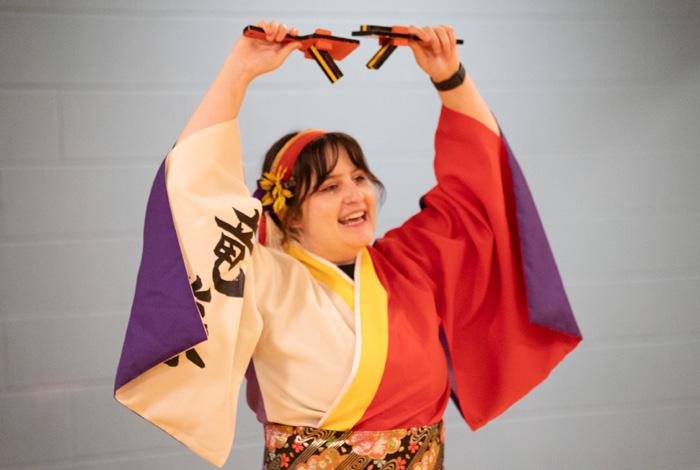 BY MONIQUE BEVER monibever@gmai.com
BY MONIQUE BEVER monibever@gmai.com
In the spirit of sharing culture and heritage, the Asian Student Conference Dance group collaborated with K-State Tatsumaki Yosakoi and the Japanese Culture Association to teach students and community members a style of Japanese dance called Yosakoi.
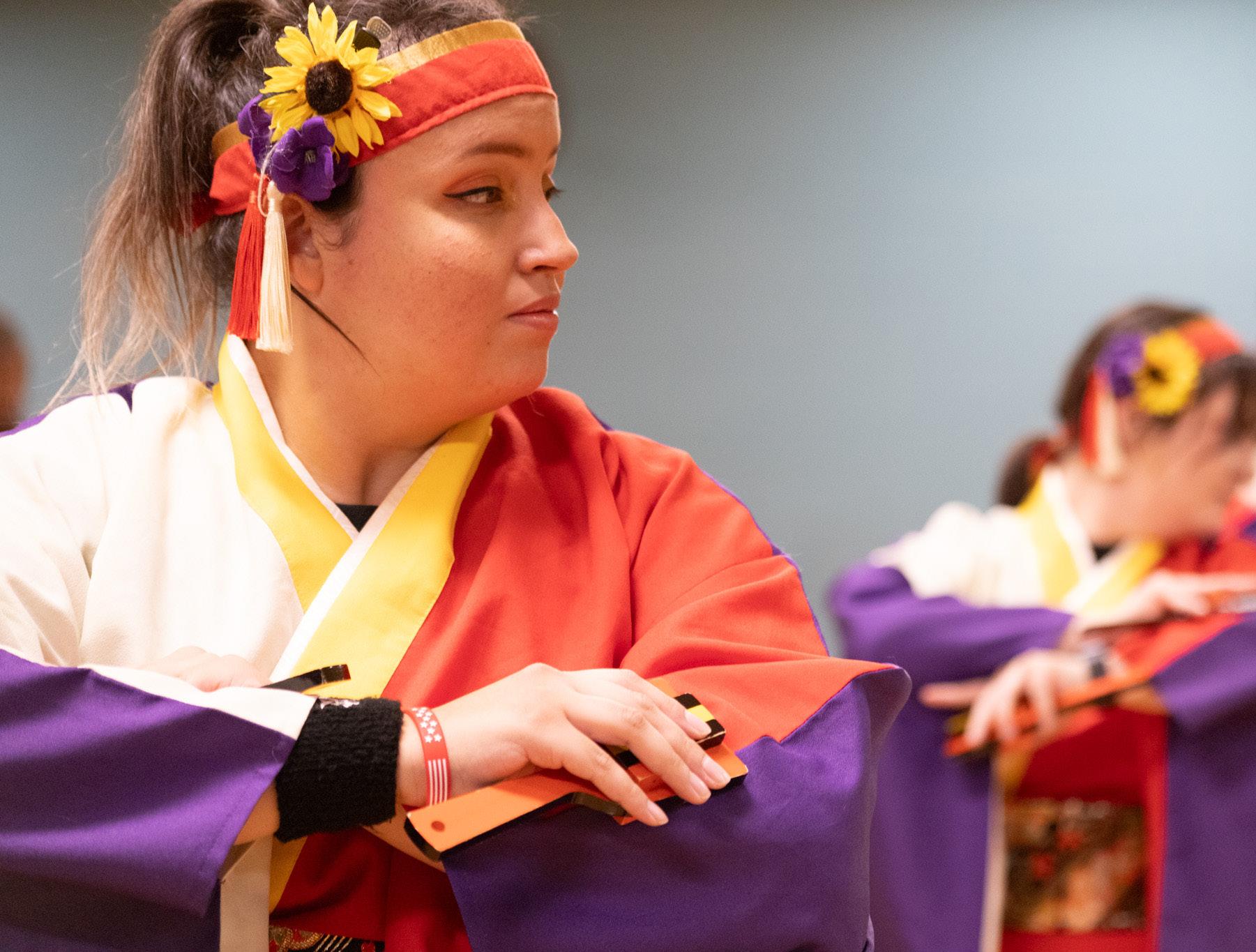
Held in the Heskett Center, the Yosakoi dance performance and workshop events invited the general public to come out and dance. While the workshop ended at 2:30 p.m., the Asian Student Conference Dance (ASCD) members continued practicing hours later.


“Having guest workshops at WSU helps amplify diversity and representation and allows for a safe space for learning and fun,” Julie Tran, ASCD group lead, said.
The Tatsumaki Yosakoi Dance Group that visited campus was founded in 2005 at K-State as the oldest Yosakoi team in the country. In 2018, representatives from
“
It’s good to branch out and be open-minded to people who love their culture and would like to spread it.
Tatsumaki were invited to Kochi, Japan, and the group was titled official Yosakoi ambassadors.
According to Tatsumaki group dancer Hayley Green, Yosakoi is a type of festival dancing from Kochi Prefecture, Japan. It started after World War II to rebuild community morale. Folk music and dance are mixed with modern, energetic dance and instrumentals.
Tatsumaki means “tornado” and honors the group’s Kansas origin. Their traditional Yosakoi costumes are customized with sunflowers for the same reason.
The event began with a dance
performance from the K-State Tatsumaki Yosakoi Dance Group members Hayley Green, Allie Zayas, Barbara Johnson and Keith Huddleston.
After the performance, attendees were taught the dance step-by-step by Tatsumaki dancers.
Madeline Lodge, a media arts student, came out to the event.
“I wanted to learn Yosakoi because I had taken dance lessons in the past and thought this might be a way to get back into the performing arts,” Lodge said.
Tran explained the importance of diversity and representation to her, which she felt the workshop helped with.
“We only know so much about ourselves,” Tran said. “If we’re from one culture (or) heritage, we only know so much about our own heritage, so it’s good to branch out and be open-minded to people who love their culture and would like to spread it.”
ASCD will perform at the annual Asian Festival on Oct. 28 at Century II in downtown Wichita.
“We’re just ready to go,” Pohto said. “We go in every day now, going hard and just trying to prepare for the first game.”
Mills said Pohto has stood out as a leader on the team.
“I couldn’t be more impressed with Kenny as a coach,” Mills said.
Junior guard Xavier Bell said he feels like Pohto has attacked this season as he has every other season.
“I think just seeing that growth from him and then him being a lot more talkative too has been huge for him,” Bell said.
Bell said the biggest change he has seen by Mills is ball movement and team togetherness.
“I think we’re more of a team than anything, no one is really a standout,” Bell said. “I feel like coach has done a great job with us, kind of getting us all together in the right rooms and the right atmosphere, just making sure we’re all coming in wanting to work and creating the right atmosphere going into the season.”
Wichita State basketball are 30 practices away from their first game on Nov. 6 at Charles Koch Arena against Lipscomb. More information about basketball can be found on goshockers.com.
KBOR revises academic program review, pulls control from universities
COURTNEY BROWN AND TRINITY RAMM newsprojects@thesunflower.com and managing@thesunflower.com
The Kansas Board of Regents has created a new academic review framework, eliminating language that would have been used to definitively protect certain university programs by labeling them as “mission-critical.”
Some Wichita State professors criticized this decision, saying it takes autonomy away from universities and gives it directly to the Regents.
At the Board’s Academics Affairs meeting on Sept. 20, Daniel Archer, KBOR vice president of academic affairs, said that, although KBOR had previously talked about exempting “mission-critical programs” from the program review, that language would no longer be in the process due to “confusion” in subsequent discussions and feedback. That exemption would have
allowed individual institutions to flag certain programs as critical to their goals, giving them special consideration during KBOR’s review. Institutions will no longer have that security.
In a statement to The Sunflower, Matt Keith, KBOR director of communications, said that the Regents will still consider whether or not a program is “mission-critical,” but that while working with the state universities, they found it difficult to adopt a single definition of “mission-critical,” due to each of their respective missions being different.
“I think it really created more confusion than it provided clarity, so that’s not going to be in the process going forward,” Archer said. “We’re really going to be moving forward with the core review here.”
Chase Billingham, an associate professor of sociology at Wichita State, disagreed. “What really happened was
that the Board of Regents, once again, took more power into their own hands regarding unilateral decisions to mandate the universities around the state to terminate academic programs,” Billingham said at a recent Faculty Senate meeting.
Keith said that each university will still be able to present to the Board about any programs being self-defined as “mission-critical.”
Since there is no regulated definition of “mission-critical,” universities are left hoping that KBOR takes their particular definitions into consideration.
These concerns are compounded with recent restructuring at Emporia State University as well as a recent study from rpk GROUP, a consulting firm hired by KBOR. Following the firm’s study, rpk identified 83% of Wichita State’s degree programs as operating below an “optimal” level.
During a Faculty Senate
discussion, both Jay Price and Elizabeth Heilman, senators from history and applied studies, expressed concerns about the involvement of rpk GROUP in creating the academic program review.
Heilman pointed to the situation at West Virginia University, where their board voted to cut 28 academic programs and terminate 143 faculty members after rpk was brought in for consultation. She requested clarification about the exact role of rpk in KBOR’s academic review process.
Price said that he would feel better about this process if rpk wasn’t involved and described it as a “hatchetman.”
“Yes, we can make recommendations, but (rpk) seems to be the bellwether that something bigger is going to be happening,” Price said. “And so if that wasn’t in the background, I’d be a lot more comfortable.”
FACULTY SENATE RESPONDS
Following KBOR’s meeting on Sept. 20, the WSU Faculty Senate voiced concern for their revised academic program review, which excludes decisive definitions of “mission-critical.”
SEE KBOR, PAGE 2
AT A GLANCE
In the Kansas Board of Regents’ latest rendition of a new academic program review, they removed the “missioncritical” terminology, citing an inability to solidify a singular definition. This language would have decisively protected at-risk programs under the review.
Wichita State faculty expressed unease toward this process, saying it strips universities of power over their own programs
WICHITA STATE UNIVERSITY’S STUDENT NEWS SOURCE SINCE 1896 www.thesunflower.com Sept. 28, 2023 Volume 128 Issue 6
JULIE TRAN ASCD group lead
Sports Management student Ryotaro Ito practices Yosakoi dance with Naruko instrument. The dance workshop was on Sept. 22 in a Heskett Center dance room.
The Tatsumaki Yosakoi dance group instructed and performed at the Sept. 22 Japanese Yosakoi Dance Performance and Workshop. The event was free and open to the public. | Photos by Monique Bever / The Sunflower
Yosakoi Dancer, Hayley Green, performs at Sept. 22 Yosakoi Performance and Workshop event. Hayley Green is a member of the Tatsumaki Dance Group.
Japanese Exchange Student Miyu Takahashi dances at Yosakoi workshop with wooden instrument called Naruko. The dance workshop was held in a Heskett dance room.
‘The DNA of what we do’: Generational bait shop tackles food insecurity
BY SALSABILA ATTARIA arts@thesunflower.com
Lifelong residents of Wichita may be familiar with P&P Seed and Bait – a bait shop that has been present in the community for almost four decades and has recently undergone significant renovation to serve a new purpose.
Mr. MC’s Market, the store’s new title, is committed to combating food insecurity and feeding their neighbors. The store now includes affordable produce such as fruit, vegetables and other household staples.

For families living within the 44-square mile radius in Wichita that is marked as a food desert, maintaining access to nutritional, reasonably-priced food is an ongoing struggle.
The magnitude of the issue has not deterred community members from taking action against food insecurity in the city. Organizations like Kansas
Appleseed and ICT Community Fridge work daily to organize better access to nutritional food through efforts, like free food pantries and aid with food stamp applications.
When Quantin McIntosh’s family bought the bait shop a year ago, they joined this effort and began the transition to opening Mr. MC’s Market.
“We’re constantly adding more products, more fruits, more vegetables, more plants, more dog food, just expanding our base,” McIntosh said.
Besides fresh produce and everyday items, Mr. MC provides hot meals to hungry customers, snack packs for children, and often takes plates downtown to feed homeless individuals. McIntosh also mentioned the store’s unique line of fresh produce, including a customer favorite – yellow watermelon.
Despite the transition, Mr. MC will stay true to their roots
rather than cut entirely.
by remaining a one-stop-shop for all things fishing and gardening. McIntosh said that the store’s origin as a seed and bait shop aligns with establishing food security in the community.
“I would say that, you know, healthy eating and, you know, sustainable healthy eating is kind of in the DNA of what we do,” McIntosh said. “We started out with seeds … so that people can have a garden and be sustainable and, of course, bait for fishing.”
The motivation
While there are different definitions pertaining to what a food desert consists of, key features include higher-priced groceries, fewer grocery stores in the area and decreased availability of nutritious items, like fruits and vegetables.
Knowing the effects of living in a food desert, McIntosh said his motivation for opening Mr. MC was personal.
“(I) personally, as well as

the fly.”
people that are close to me, have combated it (food insecurity),” McIntosh said. “Diabetes, high blood pressure, obesity – a lot of those issues are compounded by the fact that, you know, there’s a difficulty finding fresh, healthy, as well as culturally appropriate produce.”
The transition from P&P to Mr. MC’s was not an easy one. According to McIntosh, the store was planned to be closed for two to three weeks for remodeling – a process that ended up taking over four months.
Then, a week after opening day, a business next door caught fire, causing Mr. MC to lose electricity for over a month.
Despite these obstacles, Mr. MC draws motivation from the community members it serves.
“(Each day) at least one person expresses their gratitude that we were able to keep the store open,” McIntosh said. “We always tell them that, you know, this is your
store, we just run it and operate it for you.”
Roadblock along the way Mr. MC’s next challenge is their recent application to Wichita’s Healthy Corner Store Initiative (HCSI) food access program. After an interview with the city on Sept. 5, McIntosh said that the store was informed that the city “pressed pause” on HCSI due to a low number of applicants.
According to McIntosh, city officials are withholding admission into the program due to Mr. MC’s lack of experience in “handling federal grant money.”
Despite this roadblock, Mr. MC is looking for different avenues to be accepted into the food access program by reaching out to potential partners better versed in federal grants.
“We’re just trying to position ourselves to be able to fully take advantage and help fight this food desert,” McIntosh said.
Jolynn Dowling, Faculty Senate president, broke down the updates from KBOR. Billingham, a sociology senator, opened the discussion by explaining his perspective on KBOR’s retooling of the academic program review, saying that he took issue with it.
Dowling and Provost Shirley Lefever said that they interpreted the information differently, stating that the university can defend certain programs and “tell their story.”
“It was an effort on the Regents’ part to give each institution the autonomy to identify the programs themselves and to make the case for each of those programs,” Lefever said.
Lefever further emphasized that this program review is similar to what Wichita State did in the past. Lefever said that she and Ashlie Jack, the associate vice president of institutional effectiveness, have been through the university’s programs and think that “it’s going to be very predictable.”
“They’re the same programs that were already on last year’s list,” Lefever said, referring to internal program review at WSU.
Neal Allen, a senator from political science, questioned if the “net” to catch certain academic programs had been widened. This widening would increase the likelihood of programs being merged
MISSION
Lefever said the process would be similar to how Wichita State approached the results of program reviews in the past. She said that they would meet with the dean of a “triggered” program’s college and the department.
“In some cases, it makes perfect sense to merge a program with another one,” Lefever said.
In other cases, Lefever said, the demand is not there, meaning the program should be cut.
After the Faculty Senate meeting, some senators spoke to The Sunflower about their concerns with how KBOR has presented this academic review process.
George Dehner, a senator from history, said Billingham put it best, saying that this decision does not give adequate voice to the faculty members and administrative officials at each university.
He said that the university’s definitions of mission-critical are now “merely a suggestion” for KBOR.
“Quite frankly, I don’t believe KBOR has the expertise to determine for the six Regents universities what is critical to their mission,” Dehner said. “If the final determination of what mission-critical is resides in their heads at KBOR, then we really don’t get to decide what the value of each program is.”
Terrance Figy, a physics senator, called KBOR dropping the mission-critical component “unfair” for “changing the rules on
The Sunflower — both in print and online — will be a timely resource of information about the Wichita State University community. It will report on news, issues, activities, academics and athletics, in addition to offering a forum for discussion, reviews and commentary. It will also be an effective learning experience for students, who will have the final authority over what is published.
LEGAL
One free copy of The Sunflower is available to members of the WSU community. Additional copies may be obtained from the newsroom, Elliott Hall 019. The Sunflower is private property and unlawful removal or use of papers is prosecutable. The Sunflower is funded by a combination of print and online advertisement sales and student fees allocated by the Student Government Association.
The Sunflower is a member of the Associated Collegiate Press, College Media Association and the Wichita Journalism Collaborative.
Copyright © 2023 The Sunflower. This newspaper, its design and its contents are copyrighted.
Figy said he chose to miss the Sept. 25 Faculty Senate meeting discussing KBOR concerns because he wanted to prioritize his mental health, saying he already loses sleep at night worrying about the academic review process’s implications.
Figy said that the KBOR framework makes him nervous, especially when considering the terminations and cuts at Emporia State last fall.
Figy said he isn’t against evaluative frameworks, but that there needs to be a “healthy balance.” He called KBOR’s process confusing and would like greater clarity on what is expected from him as a faculty member.
“I’d love to have a dialogue,” Figy said. “You know, tell me what you think we should be doing. Maybe let’s just have some honest discussions here, as opposed to using the bureaucratic mechanisms to do this.”
MISSION-CRITICAL PROGRAMS AT WICHITA STATE
Before the Sept. 20 meeting, Wichita State prepared a list of “mission-critical” undergraduate programs, explaining their review process and principles. That list was presented by Dowling on Sept. 11, according to the Faculty Senate website. Programs deemed as
EDITOR IN CHIEF Mia Hennen editor@thesunflower.com
ADVERTISING/DESIGN MANAGER Thy Vo admanager@thesunflower.com
MANAGING EDITOR Trinity Ramm managing@thesunflower.com
INVESTIGATIVE NEWS EDITOR Courtney Brown newsprojects@thesunflower.com NEWS EDITOR Allison Campbell newsprojects@thesunflower.com
“mission-critical” were stated as reflecting WSU’s three priorities: access and affordability, developing the talent pipeline and economic prosperity.
“As with any decision, we consider our existing resources with these priorities to determine what programs are phased out, merged or placed on an action plan,” the Wichita State document stated.
Wichita State listed the following programs as mission-critical programs with low enrollment, marked under “maintain”: geology, physics, philosophy and sociology.
Other programs were listed as mission-critical and needing enhancements or improvements, marked for “review for phase out, merge or action plan.” Those included: PreK-12 physical education, forensic science, homeland security and women’s, ethnicity and intersectional studies.
All other undergraduate academic programs were listed under “maintain” with “no concerns.” In this category, American Sign Language, applied linguistics and organizational leadership and learning were all noted as new programs. The full list of programs can be found at thesunflower.com.
TIMELINE MOVING FORWARD
KBOR will release the finalized list of programs for universities to make decisions at their Oct.
ARTS & CULTURE EDITOR Salsabila Attaria arts@thesunflower.com
SPORTS EDITOR Melanie Rivera-Cortez sports@thesunflower.com
OPINION EDITOR Sascha Harvey opinion@thesunflower.com
19-20 meeting at the University of Kansas.
The universities will have six months to conduct their own reviews and get feedback to the committee by April 20.
After reviewing those recommendations, KBOR’s Academic Affairs committee will advise the full board in May 2024, and KBOR will make the final decision about what happens to academic programs in June 2024.
PROGRAMS DEEMED AS “MISSION-CRITICAL” BY WSU
Wichita State listed the following programs as mission-critical programs with low enrollment, marked under “maintain”: geology, physics, philosophy and sociology.
Other programs were listed as mission-critical and needing enhancements or improvements, marked for “review for phase out, merge or action plan.” Those included: PreK-12 physical education, forensic science, homeland security and women’s, ethnicity and intersectional studies.
All other undergraduate academic programs were listed under “maintain” with “no concerns.” In this category, American Sign Language, applied linguistics and organizational leadership and learning were all noted as new programs.
CONTACT US
019 Elliott Hall 1845 N. Fairmount Ave. Campus Box 134 Wichita, KS 67260-0134
EDITORIAL Mia Hennen: 316-978-6906 editor@thesunflower.com
ADVERTISING Thy Vo: 316-978-6905 admanager@thesunflower.com
FACULTY ADVISOR Amy DeVault: 316-978-6052 amy.devault@wichita.edu
2 | Sept. 28, 2023 www.thesunflower.com NEWS
EDITOR
podcast@thesunflower.com
Sunflower, founded in 1896, is the student-run newspaper covering Wichita State University. The print edition is published Thursday during the fall and spring semesters. The staff publishes daily online at www.thesunflower.com.
The Sunflower is committed to accuracy in its publications. If you find an error in any of its publications, please email the editor at editor@thesunflower.com immediately.
PHOTO EDITOR Kristy Mace photo@thesunflower.com PODCAST
Jacinda Hall
The
CORRECTIONS
Illustration by Makenzie Miller / The Sunflower
KBOR FROM PAGE 1
NSF fellowship offers stipend for STEM majors
BY LYDIA STEEBY steebylk@gmail.com
College prices are rising, and it’s increasingly important for students to find financial support. The National Science Foundation’s Graduate Research Fellowship Program is one way to help students pay for their education.
This fellowship is open to firstyear domestic graduate students and seniors who are United States citizens, enrolled full-time and pursuing a research-based degree in science, technology, engineering or math (STEM).
Coleen Pugh, the vice provost for research and dean of the graduate school, is also the university representative for the NSF fellowship. She explained that applying for the fellowship can be complicated.
“It’s a very different type of program than any other program we have on campus,” Pugh said. “And so, unfortunately, we’ll have to experience some pains with people figuring out how to work with this award.”

Student Supreme Court finds
BY TRINITY RAMM managing@thesunflower.com

After receiving five different requests challenging Student Body President Iris Okere’s cabinet appointments and other leadership positions within the Student Body Association, the Supreme Court unanimously denied these requests, signed by Chief Justice Maureen Wetta.
Vishnu Avva, a former at-large senator, was represented by Kian Williams, another former SGA senator. Avva made five requests to the court about “concerns regarding the legality of the cabinet appointments made by the Okere Administration during the 66th session.”
Avva has previously expressed frustrations about the application process for positions in Okere’s cabinet.
During an SGA meeting, Avva called for the resignation of both Okere and Student Body Vice President Sophie Martins.
Four positions were called into question by this court filing:
• Student Body Treasurer, held by Jia Wen Wang
• Director of Legislative Affairs and Policy, held by
Valeria Paunetto
• Graduate Student Advocate, held by Tatumn Graham

• Code of Ethics and Accountability Task Force Chair, currently held by Aubany Russell.
Request #1
Avva asked the Court to intervene and prevent the four listed “offending parties” from exercising their power until the Court comes to a full decision about all requests.
The Court found that Avva did not have the standing to bring the case to the Court, meaning that they did not feel Avva had “sufficient connection to and harm from the law or action challenged.”
Request #2
Avva also wanted the Court to rule the application process both unconstitutional and a violation of Article X of the Student Government Association’s bylaws.
According to Article X, Chapter 2, Subsection 2, “the President shall nominate the most qualified applicant for the position based on the applicant’s application and interview and shall present the nominee to the Senate.”
The Court interpreted Article X as leaving the need for both an interview and
an application in order to determine the most qualified applicant up to the president’s discretion.
Request #3
Avva’s third request was that the Senate bills and executive orders that verified these four offices should be nullified and the offices should be voided. The Court found no grounds to vacate those offices or nullify those documents.
Request #4
Avva asked that if the Court cannot vacate these offices, even if they find the legislation unconstitutional, they should submit documentation to the Membership Review Board with their findings. Based on the previous rulings, the Court found no reason to submit challenges towards those offices.
Request #5
Avva requested that the Court allow public, oral arguments about the previous requests in order to get the most impartial verdict. The Court found “no compelling reason” to do so. This request was denied. The Supreme Court’s full dissent can be read at thesunflower.com.
Pugh also explained that the fellowship is very important to campus, not only because it funds most of campus research, but because of their goal.
“The National Science Foundation has three primary goals: it is to promote the progress of science, to advance national health, prosperity and welfare, and also to secure national defense,” Pugh said.
The GRFP Fellowship boasts many benefits to Wichita State students. Over the five-year fellowship, students will receive $37,000 over a three year period, with an additional $16,000 to pay institution fees. This money is designated for tuition, research expenses and materials to help students with their research-based degrees.
“The idea is that if you win this, you shouldn’t have to pay for anything,” Pugh said.
Outside of academics, the NSF fellowship aims to provide opportunities for underrepresented people to pursue careers in STEM fields.
BY AVERY GATHRIGHT averygathright@outlook.com
This spring, roughly 300 students applied to be part of a 10-week undergraduate research program in criminal justice at the University of South Carolina over the summer. Senior Jordan Cline was one of nine to be accepted.

Cline’s experience was funded by the National Science Foundation (NSF), as part of their Research Experiences for Undergraduate program, which is designed to model graduate research.
Cline, who is majoring in criminal justice and minoring in philosophy and political science, spent at least 40 hours each week on his research. Cline explained that the experience helped him gain more knowledge about statistics and how race can affect his field of study.
“We were basically doing a statistical analysis of the sentiments regarding reallocation of police funding after the death of George Floyd, and how sentiments about race and racial resentment informed those feelings,” Cline said.
Cline, who hopes to attend graduate school in the future, said that the program will help him gain an edge over other applicants.
“It was invaluable,” Cline said. “The experience of actually getting to work closely with faculty and graduate students and just other students, you don’t get to do that often in your undergraduate experience.”
Cline first found out about the program when the School of Criminal Justice sent him the application.
“I was looking at (the application), and I was like, ‘Okay, this
“If you’re going to be developing a workforce, of course, now it’s really important to include the underrepresented,” Pugh said.
Pugh also explained the fellowship searches for people who will impact the future.
“What this program is doing is it’s trying to identify the leaders of the future, the ones who are going to be the innovators in the future,” Pugh said.
The GRFP application is thorough, asking applicants about the extent of their familiarity with STEM but also about what they can bring to the fellowship as a person.
The personal aspects of the fellowship focus on two main categories: intellectual merit and broader impacts. The intellectual merit section refers to the applicant’s achievements.
“For intellectual merit, they’re going to make some evaluation about this based on your academic performance, your grades, the curriculum that you followed, your awards,” Pugh said. “And then of course, (they’re) going to look at your research plan, your professional experience and then the reference letters.”
The section on broader impacts evaluates how applicants can change the world for the better.
“Again, they’re going to be looking at your reference letters for this, but they’ll be looking at your prior accomplishments and future plans, individual experiences you’ve had, and then of course, potential benefits to society that your activities have influenced and … your community outreach,” Pugh said.
The NSF-GRFP fellowship supports research degrees in a variety of fields. Past WSU winners of the scholarship studied biomedical engineering, aerospace engineering, and human factors psychology.
More information about accepted STEM pathways can be found on the NSF-GRFP website. Deadlines for the NSF-GRFP fellowship take place in late October, with winners announced in early April.
would be a really beneficial opportunity,’” Cline said. “It’s designed to model graduate school, and it’s in my field and everything. I’m going to take the chance and apply to this.”
The application included two letters of recommendation, one of which was written by associate professor Yumi Suzuki. Suzuki, who taught Cline in her Multiculturalism as well as Criminal Mind and Behavior classes, explained that Cline’s curiosity and initiative made him a good candidate for the program.
“He actually stopped by my office during my office hours,” Suzuki said. “He asked a lot of questions to other faculty members as well, regarding career choices or any criminal justice field issues.”
At the end of the program, Cline and his fellow researchers had to present their work at a symposium, along with other research teams funded by the NSF. Currently, the team is trying to get their presented research published.
“We’re working on finalizing the paper,” Cline said. “The graduate mentor and the faculty mentor who work at the University of South Carolina are in the process of basically melding together all of our individual drafts of the paper. Then we’re going to finalize what that will look like.”
Suzuki said that Cline’s 10-week research experience can help any student land a “great job” in the criminal justice field and have a bright future.
“I think anybody should … have real-life experience about how they can use research skills and knowledge in real life issues, especially in the criminal justice field,” Suzuki said. “We need new leaders, new generations, to tackle many issues that we couldn’t really do at this point.”
Sept. 28, 2023 | 3 www.thesunflower.com NEWS
AVVA
Chief Justice Maureen Wetta speaks to various people at Wichita State at the State of the Student Body on Sept. 6. |
Photo by Mia Hennen / The Sunflower
‘It was invaluable’: Senior participates in criminal justice summer research program
CLINE
Okere administration cabinet appointments constitutional
Fairmount College welcomes ASL faculty to language department
BY AINSLEY SMYTH ainsley.smyth3@gmail.com
Wichita State is offering a new degree this semester: a Bachelor of Arts in American Sign Language (ASL).









































ASL courses are now offered within the modern and classical languages and literatures (MCLL) department in the Fairmount College of Liberal Arts and Sciences (LAS). Previously, ASL fell under the College of Health Professions in the department of communication sciences and disorders and ASL was available as a minor, but not a major.
The department held an event on Friday to welcome ASL faculty to Fairmount.
“We think it’s a language, like any other language, so we are very happy that it’s being taught in our department now,” Rocio del Aguila, the Chair of Modern
and Classical Languages, said.
According to del Aguila, the move was necessary due to increased student demand for the major, interest in ASL courses, and a need for more ASL interpreters in Wichita and beyond.
James Clark, a lecturer who teaches ASL and deaf culture classes, emphasized this need as well. Clark signs in ASL and uses an interpreter.
“There are not a lot of programs nationwide that have this degree for interpreters, so this kind of program is desperately needed,” he said.
The change took several years, according to del Aguila’s predecessor, Wilson Baldridge. “We put together a proposal, and it went through the university’s process of curriculum change,” Baldridge said. “It went to the Faculty Senate and to the administration, Academic Affairs and then to the Board of Regents.”


Langston University professor urges audience to take opportunities
BY LOREN AMALUNKE loren.amelunke@outlook.com
Christianna Howard-Smith from Langston University presented a seminar in Hubbard Hall this week to encourage students that even small beginnings can lead to dream careers.
Langston University is the only historically Black college or university in Oklahoma. The school opened in 1898 on a budget of $5,000 in a Presbyterian church. She emphasized that although the biological science department at Langston University consists of one hallway, because of conversations and connections, the students have unique opportunities.
The department received $4.9 million from NASA to conduct a research
project in five years. Through Langston University’s NASA Advanced Research in Biology Center, students can research space exploration immunology to study how gravity affects the bodies of astronauts in space.
“See? Small beginnings, large successes,” Howard-Smith said. She briefly discussed how one’s socioeconomic, ethnic or racial background can get in the way of achievements, whether it be acceptance into a school, winning a scholarship or receiving a job offer.
“Make sure you’re keeping a positive attitude about everything,” HowardSmith said. “If you keep a positive attitude and work hard, you’ll get to where you want to go.”
Clark expects the department to face challenges, including larger class sizes, struggling to find more faculty if the degree draws more students to ASL courses and filling the vacant director position.
“It’s a fear I have that we will have growing pains,” he said. “We need someone to lead the program that is specifically deaf oriented. We really have to look all over the U.S. to have someone help lead this program. We need the right person.”
LAS is currently trying to find a director for the ASL program. According to the LAS dean, Andrew Hippisley, they hope to start interviewing candidates this semester and for the director to start in August 2024.
The first student who will obtain the Bachelor of Arts in ASL is expected to graduate in December.
Maddie Fields, who plans to become
certified and work as an ASL interpreter, said she finished her bachelor’s degree in sociology in May but stayed at WSU when she learned that the ASL degree would be offered.
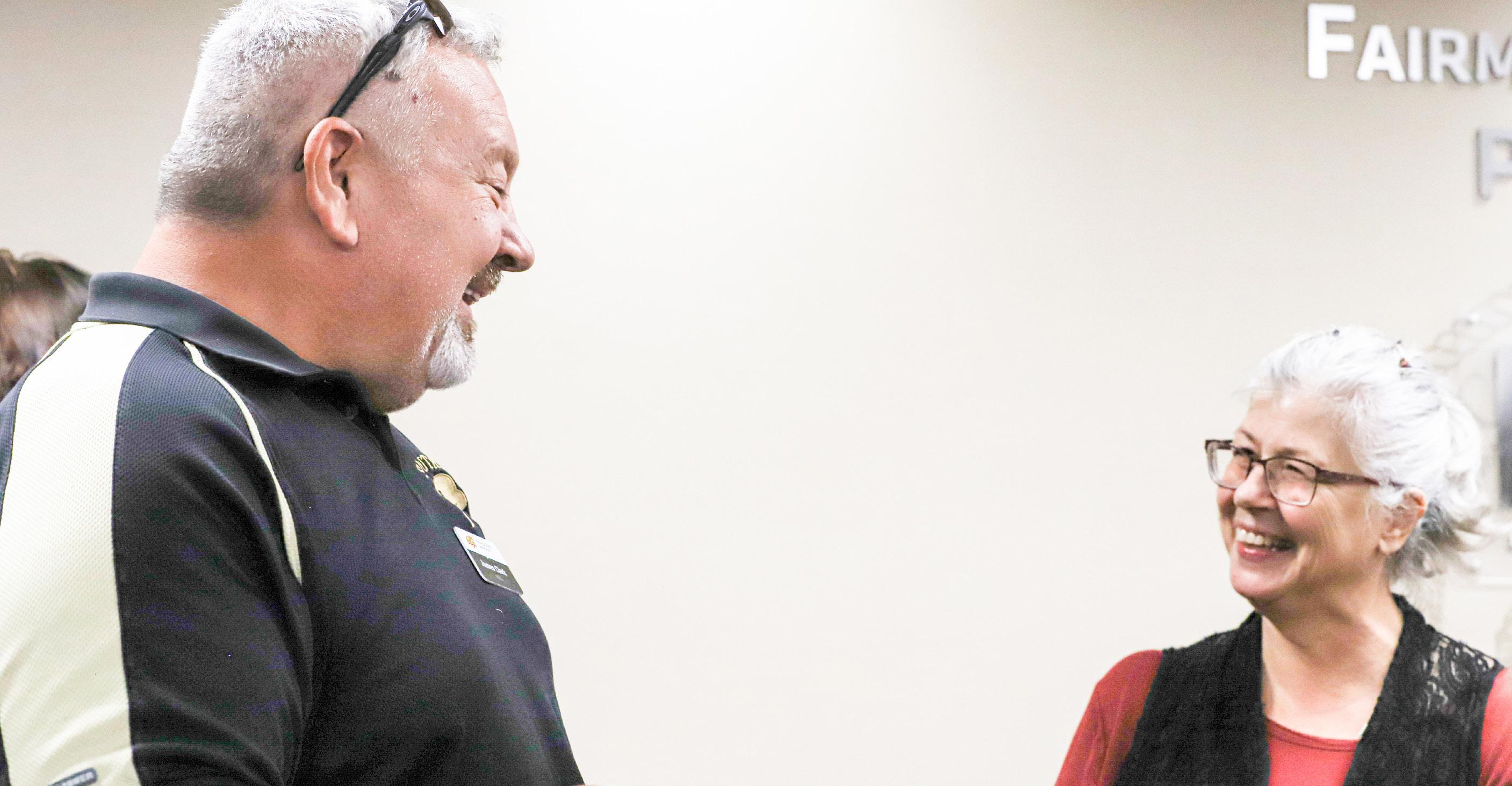
“I already had the minor, and I had used my electives to take more classes,” Fields said. “I had taken seven classes under similar things to ASL, and then they were all part of the major and there were just five new classes that I would have to take.”
Fields is one of 15 students who have declared an ASL major, according to Hippisley. These students have the option to choose from three tracks: interpreting, deaf culture and language structure.
Under MCLL, students with prior ASL knowledge can take a placement class to forego lower level classes.
For more information on the ASL program, visit their website.
Wichita State University, WSU Tech celebrate record-high enrollment
BY ALLISON CAMPBELL news@thesunflower.com
Universities across the state are celebrating record-high enrollment numbers, and Wichita State and WSU Tech are no exception.
With a total headcount of 17,548 and 5,655 students, respectively, Wichita State and WSU Tech have achieved the highest enrollment rates in either college’s history.
The overall headcount at Wichita State increased by 3.7%, from 16,921 students in 2022, while WSU Tech increased by 12.6%. According to the Kansas Board of Regents (KBOR), all universities in its system experienced a 2% overall increase, and technical colleges saw an 8.6% increase.
Other enrollment highlights for Wichita State include a record-high increase in student credit hours, a 1.8% increase in undergraduate
degree-seeking students and an increase in underrepresented undergraduate minority students by 23.9%.
WSU Tech boasted 48,379 credit hours, the highest adult post-high school headcount and highest number of high school students enrolled for a fall semester. Additionally, 25% of WSU Tech’s student population identifies as Hispanic or Latino, setting another record for the technical college.
The enrollment spike also raises concerns regarding how student services will be able to serve a larger student population. Student resources, academic affairs and event planning resources are just some programs that may be at risk while trying to accommodate a larger student body.
A complete list of enrollment numbers can be viewed from the KBOR website.
4 | Sept. 28, 2023 www.thesunflower.com NEWS
James Clark, an educator that teaches to students all around Wichita, and his interpreter Darla DeSpain, said it is important that ASL is at least taught to everyone due to a shortage of interpreters. |
Photo by Mel Bright / The Sunflower




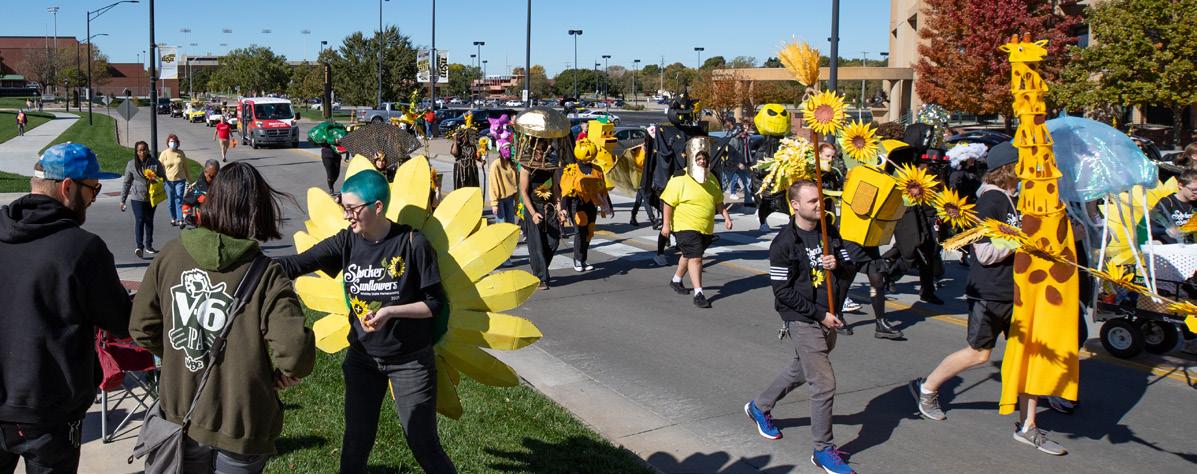
Sept. 28, 2023 | 5 www.thesunflower.com ADVERTISEMENT Find a full list of events at WICHITA.EDU / SHOCKTOBERFEST. WICHI TA S TATE UNIVERSITY OCTOBER 2023 Join your fellow Shockers and the Wichita community October 2–8 for Shocktoberfest, when we celebrate all things Shocker. PARADE CONCERTS PARTIES SHOCKER MADNESS OCT. 2–8 What’s yellow, black and awesome all over?
‘NOTHING CRAZY’
Wichita State volleyball sweep the University of Charlotte
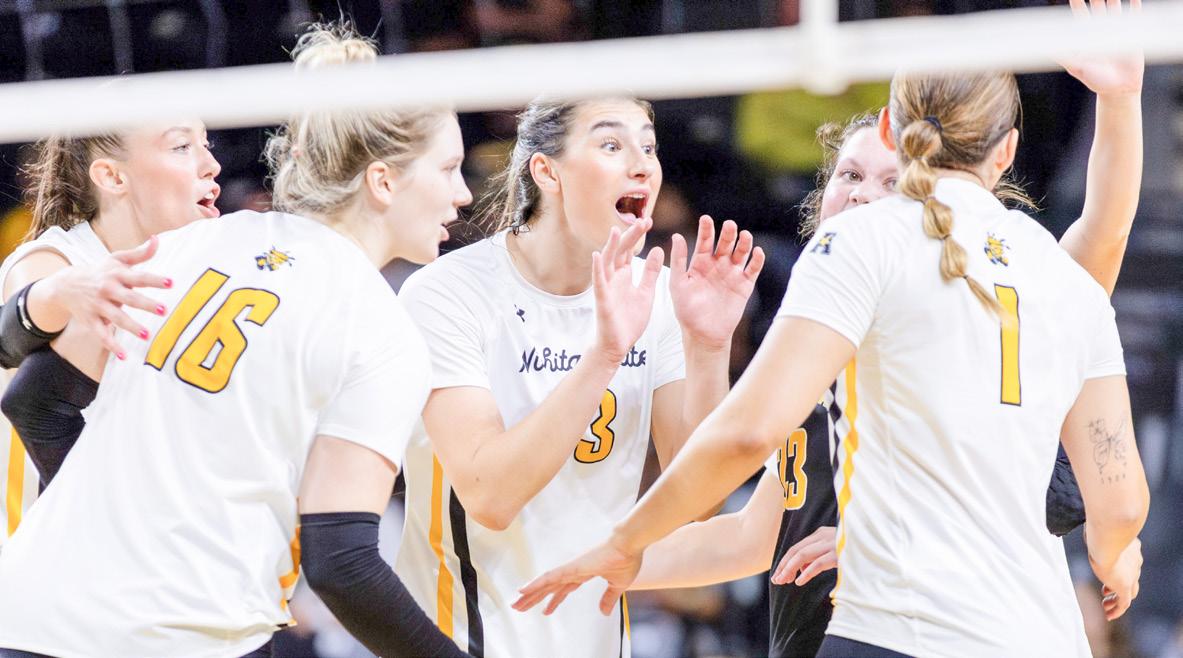 BY MELANIE RIVERA-CORTEZ sports@thesunflower.com
BY MELANIE RIVERA-CORTEZ sports@thesunflower.com
After four wins on the road, the team continued their winning streak at Charles Koch Arena on throwback night with a sweep against Charlotte (25-14), (25-13), (25-17).
“We were not going to say we doubled on and points tonight, but it looks that way, almost doubled them in kills,” Head Coach Chris
Lamb said. “It’s just nice to have the firepower; I can’t wait to dive deeper into it.”
Junior Natalie Foster and junior transfer Barbara Koehler both lead the Shockers with nine kills. Senior opposite Sophia Rohling followed with eight kills with no errors on 14 swings.
Koehler is playing her first season with the Shockers and had a dominant performance. (To see more on Koehler, visit page 7.)
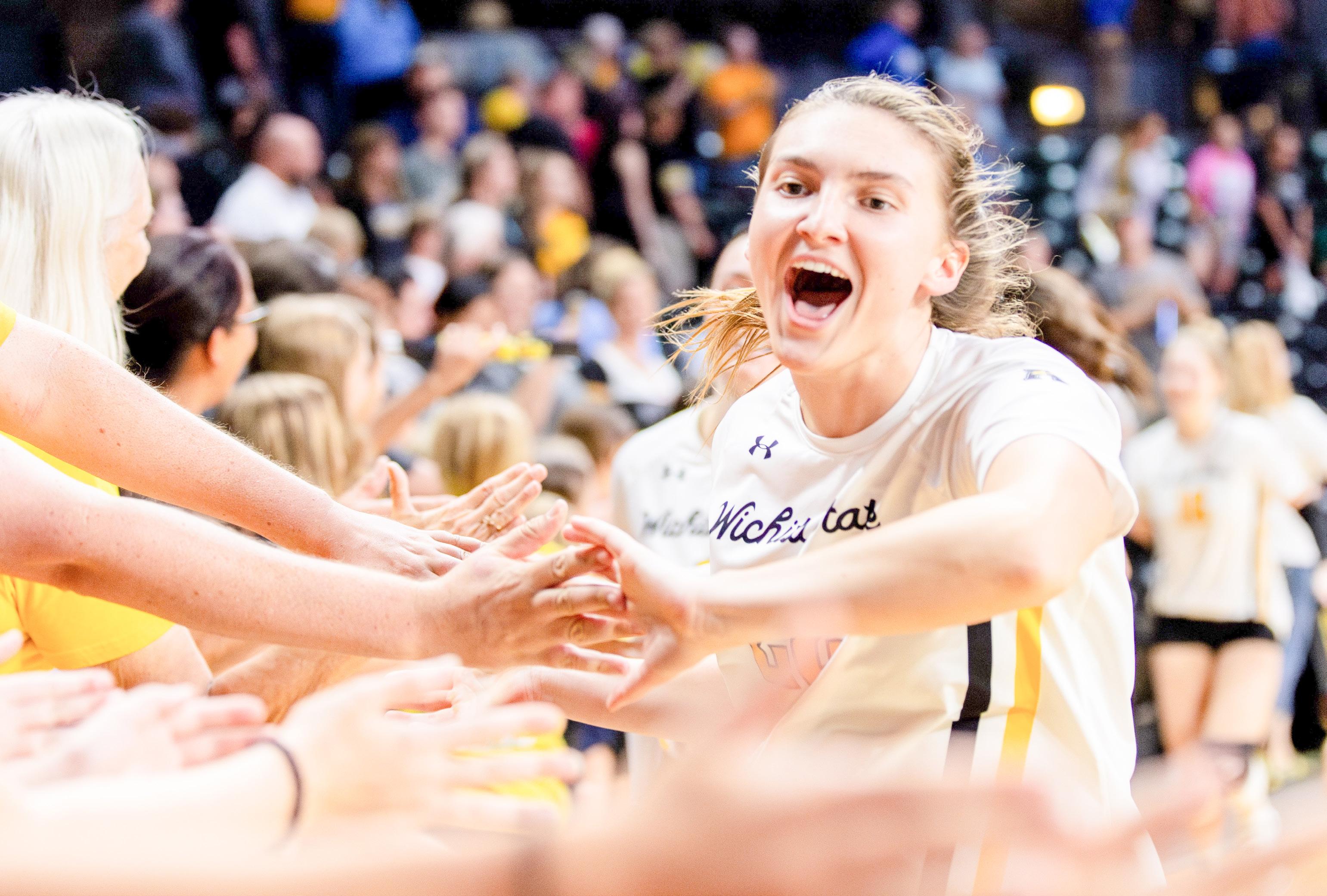
“She’s never not been just a starter but the go-to player in
every team she’s been on,” Lamb said.
Lamb said Koehler has been riding a bit of a wave but has had great practice performances leading up to the game.
“Tonight, she got a chance to shine, and she did,” Lamb said.
Sophomore Emerson Wilford added six kills and a career high of 12 digs. Senior setter Izzi Strand had 31 assists.
Redshirt junior Morgan Stout had five kills. Lamb said that although she did not have a lot of
production in terms of points, she had 17 tactical attacks.
Wichita State had a 9-1 run early on in the first set and never looked back. The Shockers stepped up their defensive game by turning in 4.0 blocks forcing Charlotte into 11 hitting errors compared to just seven kills from Wichita State.
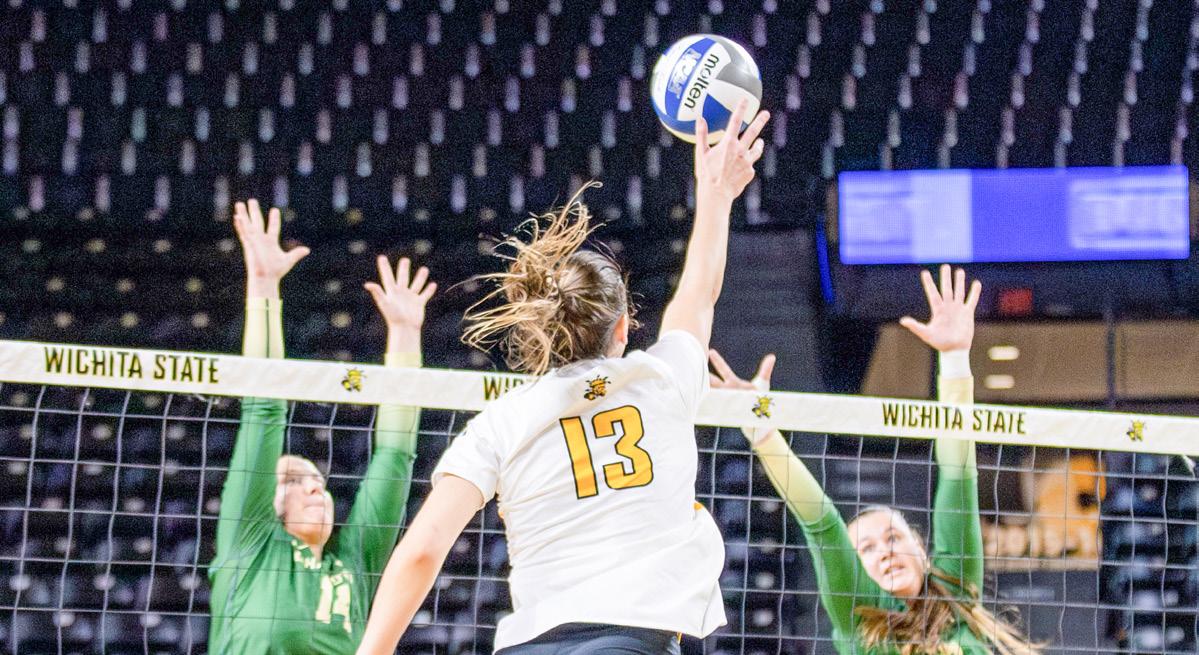
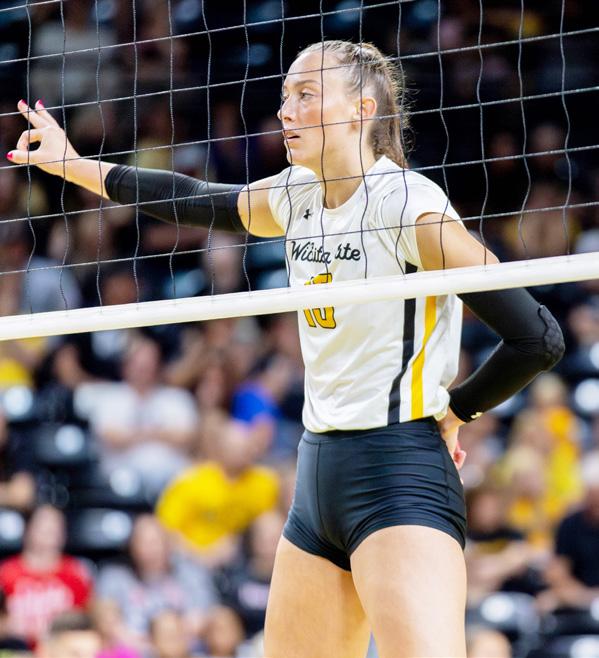
“I just think like going into this game, specifically Lamb kind of told us that there was nothing too crazy or special that they did offensively,” junior libero Annalie
Heliste said.
Heliste had seven digs, one assist and one serving assist.
“I think from a backroad offensive standpoint, it was just simple volleyball to play tonight, and I think that kind of helped us go in there and just normal defense, nothing crazy,” Heliste said.
Wichita State volleyball with play two matches on the road against SMU on Friday Sept. 29, at 7 p.m. and Sunday, Oct. 1, at noon.
‘A lot of work to be done’: Saal outlines improvements to be made to student-athlete health services
BY ALLISON CAMPBELL news@thesunflower.com
In response to a request by the Kansas Board of Regents (KBOR), Director of Athletics Kevin Saal shared the athletic department’s strategic five-year plan to enhance and establish new health-based services for student-athletes, such as improvements to staffing, emergency protocols and nutrition care.
Last year, KBOR published a list of recommended student-athlete health care initiatives with unique requests for each Kansas university. Athletic directors from Kansas State University, the University of Kansas and Wichita State University gave presentations on Sept. 20 regarding their school’s future student-athlete healthbased initiatives.
“Our mission at Wichita State is to develop young people and programs the ‘Shocker Way’ through first-class service to our student-athletes,” Saal said. “So obviously this (KBOR student-athlete based health services) aligns very much with what we do and what we believe in ‘the Shocker way.’”
Saal’s five-year strategic objectives included human resource and staffing improvements, updates
to policy and procedure, and updated standards and practices to better supplement WSU’s 250 student-athletes.
HUMAN RESOURCES AND STAFFING
Recent additions to the sports medicine unit at Wichita State include a new certified athletic trainer for track and field and cross country, a patient care coordinator, and a mental health and performance counselor. To enhance the student-athlete quality of care, Saal hopes to soon replace three graduate assistants with full-time employees and add a sports nutritionist or dietitian to the health care staff roster to optimize the Shocker Health and Performance Unit.
“There’s a lot of work to be done,” Saal said. “We are in the process right now of completely reorganizing, really, our sports medicine.”
Additionally, there are plans to establish an associate or senior associate administrator for health and performance and a certified athletic trainer for baseball. POLICY AND PROCEDURES
Improving medical emergency
protocols and enhancing policy education are also on Saal’s agenda. Updates to Shocker Athletics policy and procedures include re-evaluating care for student-athletes experiencing or at risk of experiencing heat illness and heat stroke, asthma, diabetic emergencies, collapses associated with the sickle cell trait and exertional and non-exertional collapses.
“Some of those elements have really need(ed) to be updated for us or created for us,” Saal said. “We all (universities) have them (medical occurrence policies), and it’s the discipline to get them out every single year, to make sure that they’re updated, to make sure that Ascension Via Christi approves those and that we socialize those with all of our constituents.”
STANDARDS AND PRACTICES
With the guidance of Ascension Via Christi, Saal hopes to adapt and incorporate new standard practices, like soft-tissue manipulation and alternative treatment methods, to be provided to student-athletes. To do so, the Shocker Health and Performance staff have established weekly meetings to “maximize the synergy throughout Shocker Health.”
Along with formalizing the framework to process student athlete anonymous data, Saal plans to improve monthly sports program support meetings and install daily readiness surveys.
WSU’s contract with its current electronic medical record system, SportsWare, expires in February, and Saal said he and the rest of the Shocker Athletics department want to identify the best new option by November or December.
Investments in student-athlete nutrition are also being explored. According to Saal, steps have been taken to expand the current student-athlete snack services to include weekly meals and to provide coordinated care for student-athletes struggling with eating disorders, injuries, body weight goals and more.
Saal said that the KBOR requests facility improvements to equipment, budget and consistency are being achieved through the Cessna Stadium renovations, which will include space for a new training room and a “suite” for the Shocker Health and Performance team.
“We’ve got to supplement some areas in our budget,” Saal said. “So we are doing a deep dive audit and a dashboard with our athletic training rooms all over campus to
make sure we understand what it is that we’re missing from a modality perspective, or equipment or resources, and make that consistent across the board.”
Saal’s “key to any successful programming and improvement” is the continuity and sustainability of compliance and education. He expects enhancements to be made in developing emergency action plans (like CPR and AED training), enhanced health care programming through mental health, nutrition and performance and behavioral science and a “culture of accountability” through punishment, or extra conditioning, workouts –and clearly defined disciplinary expectations.
“We certainly have some areas that we’ve summarized that we need to get better,” Saal said. “I think that there’s some areas that we’re doing well in terms of the resources that we have as well.”
Saal said improvements will continue to adapt to the needs of student-athletes and the university, and KBOR will be updated with the latest developments as they are rolled out over the next five years.
“There’s no finish line on this developmental pathway for us,” Saal said. “We will continue to pursue excellence in all those areas.”
SPORTS 6 | Sept. 28, 2023 www.thesunflower.com HAVE A STORY IDEA? Contact the Sports editor, Melanie Rivera-Cortez sports@thesunflower.com
Junior outside hitter Morgan Weber runs a lap around the arena with her team, high fiving fans. Wichita State won against Charlotte, 3-0 on Sept. 23. | Photos by Kristy Mace / The Sunflower
The Wichita State volleyball team celebrates after scoring a point in the first set. Wichita State took this set 25-14.
Middle blocker Morgan Stout signals the play to her teammates before the serve.
Freshman hitter Emerson Wilford hits the ball over the net in the third set againt Charlotte. Wilford scored 12 digs against the 49ers on Sept. 23.
Softball falls to University of Kansas
BY MELANIE RIVERA-CORTEZ sports@thesunflower.com
Wichita State softball faced off against their in-state rivals, the University of Kansas, in a doubleheader. The Shockers lost both games, 3-1 and 5-3.
Last season, softball faced off twice against KU, winning the first face off 9-3 then went on to lose the second game 3-1.
“We want them to be competitive in every aspect of the game, and they’re doing that. They’re going out there and playing hard, but at the end of the day, this is the learning time for us to get better,” Bredbenner said.
During the first game, sophomore infield Sami Hood went down with a left-hand wrist injury, and the team had to adjust to the change quickly.
“I tried to slow it down, tell everyone like ‘Hey, like we’ll be fine,’” Cooper said. “We just had to get this one out because Sami’s a big part of the infield, and so to move it all around, it’s big. We do this every day, we put people in different positions every day so that it would be fine.”
Bredbenner said she doesn’t know the extent of the injury but would play it by ear.
Freshman infielder Sydney Zennon had a solid batting performance.
“You’re seeing Sydney, she’s starting to get good plays, she’s starting to get good hits,” junior left-handed pitcher Allison Cooper said.
Cooper said, for her, the game was a learning experience because she learned something every inning.
“I learned that like, I can go in there and just throw because I think a lot of the times sometimes there’s like almost a block of like, ‘I gotta get this pitch,’ but like, I can just go in there throw and get my out,” Cooper said. “I’ll let my defense work, I know that they got my back.”
She said playing a doubleheader allowed her to push herself mentally.
“I think it was whenever you get in those like, ‘Oh, this is getting hard like you got to push through,’ so I think it really helps getting that like mentality of keep pushing,” Cooper said.
Bredbenner said they have a lot growing to do as a team.
“We’re playing six freshmen and a transfer, and without some of our best players and the ability to play a normal game, but this is what this is all about right?” Bredbenner said. “Playing the best competition in the fall that we can and letting all our kids play and get as much experience as possible, learning from our mistakes.”
Despite both losses, Bredbenner said she had a lot of great takeaways from the game.
“I thought we got better from game one to game two offensively had a good approach,” Bredbenner said.
She said the team did a better job defensively but knows there is room for improvement.
Wichita State softball will be back in action for an on-theroad game on Oct. 1 against Oklahoma State University. First pitch is scheduled for 3 p.m. More information can be found at goshockers.com.
 Illustration by Cameryn Davis / The Sunflower
Illustration by Cameryn Davis / The Sunflower
Newly-formed kickboxing club trains beginners for self-defense, discipline
BY JACOB UNRUH jacobunruh333@gmail.com
Despite being formed less than a month ago, the Wichita State kickboxing club is off to a strong start. About a dozen people congregated in the Heskett Center this week to learn the basics of a martial art that teaches self-defense and discipline.
Founder of the club, senior Michael Sonexarth, said his uncle was a kickboxing champion in Thailand. Sonexarth took up the sport when he was around 5-yearsold. He stopped a few years later but picked it back up late in high school.
“I was doing it for about a couple of months at the YMCA,” Sonexarth said. “Sometimes, I would come here to practice with some friends, and I realized that I loved the sport, and I wanted to show it to other people.”
Shay Hattle, a friend of Sonexarth, said the idea of forming the club came after their group struggled to find places to spar on campus.
“We would go to the Heskett Center and just try to find random rooms that were open and spar on the bare floor,” Hattle said. “Eventually, we got to a point of people would interrupt our fights because they have rooms reserved, and we had to get kicked out and go upstairs. So eventually, Michael started putting his foot forward and being like, ‘Alright, I’m just going to make a kickboxing club.’”
Sonexarth placed numerous
posters around campus to advertise the new club. He said he wasn’t expecting as high a turnout for the first few meetings.
“I was kind of worried, (like) maybe I’m putting all this effort and maybe it’s not going to show as much as I thought it would,” Sonexarth said. “But I’m actually pleasantly surprised at the amount of turnout we’re getting and it makes me happy to show the sport to more people.”

Beginners don’t start fighting on their first day. Instead, Sonexarth taught the basics of how to throw basic punches, move your feet and stay balanced.
“The biggest thing I want to teach them is to find their own sense of balance,” Sonexarth said. “Yeah, you can teach someone how to throw a punch or a kick, but for every single person, it’s going to be slightly different because every single person’s body type is unique.”
Freshman Muhammed Ghais Saleem had never tried kickboxing before attending his first meeting on Monday, Sept. 25. He said Sonexarth’s lesson has given him a more technical understanding of what happens during fights.
“In boxing, you hear jab, you hear hook, you hear uppercut, you hear cross, everything,” Dhaissaleem said. “But over here … Michael taught us a bit more into it, so I got a clear visual. So next time I watched boxing or anything, I would understand what the coach is saying.”
Hattle said another benefit of kickboxing is learning skills to defend yourself in a physical confrontation. He pointed out that compared to other forms of fighting like boxing and karate, kickboxing has a more practical application.
“It never made sense to me, for boxing, if you were in a fight, you’re only going to use your fists when you have these big old leg cannons on you,” Hattle said.
Sonexarth said that while becoming proficient at kickboxing requires a lot of dedication, the journey has improved his mental discipline.
“I learned a lot through kickboxing such as, you’re never going get what you want overnight,” Sonexarth said. “You’re going to have to work hard for it. You’re never going to pick something up and be immediately good at it, and if you are, you’re not going to be better than someone who trains more than you.”
THE KICKBOXING CLUB MEETS FOUR TIMES A WEEK AT THE HESKETT CENTER ROOM 141:
MON: 6:30 - 8 P.M.
TUES: 6:30 - 8 P.M.
FRI: 8 - 10 P.M.
SAT: 4 - 6 P.M.
BY SALSABILA ATTARIA arts@thesunflower.com
Present on campus since the 70s, the rowing teams have largely flown under the radar of the university’s athletic spotlight. Wichita State women and men’s team captains Maureen Wetta and Tony Le implemented a number of changes to the team this year to bolster morale and bring the rowing team to the forefront of campus life.
Neither Wetta nor Le had prior knowledge of rowing when they first heard of the team on campus. Wetta learned of the organization through an informational meeting, and Le heard about it in passing from a classmate in his calculus class. Now in their senior year, both are proud leaders of a team 60 members strong – one of the largest groups the team has seen, according to Wetta.
“I honestly didn’t even know rowing was a sport,” Wetta said. “From then on, it’s just been a great experience with new crews coming in and just building that legacy and to now have the opportunity to lead as a team captain.”

Leading the rowing teams has allowed both captains to build their leadership skills while having fun.
“What kind of led me to that leadership role is … it puts me out of my comfort zone so much,” Le said. “And I think it’s just such an amazing opportunity for me to really step down and really reflect on how I want to present myself.”
When planning for the season over the summer, Wetta and Le decided to spread the opportunity they had been given after being voted captains by implementing a new leadership system.
Five other rowers stepped into leadership roles in August when the roles of event chair, gear chair and fundraising chair were established for both the men’s and women’s teams. The central goal behind this change was to alleviate the workload of the team coaches, Calvin Cupp and Rachel Tuck.
“It gives us a lot of responsibility to feel a little bit more connected to the team and that we’re contributing a lot more than just, you know, showing up to practice and rowing every morning,” Wetta said.
Adding these new positions allows more rowers to practice communication and team coordination skills to implement in and out of the water.
season of
life’: Transfer Barbara Koehler adjusts to life at WSU
BY SHAYLEE JACOBS-WILSON shaeryann2@gmail.com
Junior outside hitter Barbara Koehler is in a new season of her life as she’s adjusting to volleyball at an American university. The Brazil native transferred to Wichita State after two years at Florida SouthWestern.
Koehler began contact with Head Coach Chris Lamb during her sophomore year of college. When she started looking into WSU, she felt as if things were moving quickly but soon found her place on the team after consistent communication and a visit to the school’s program.
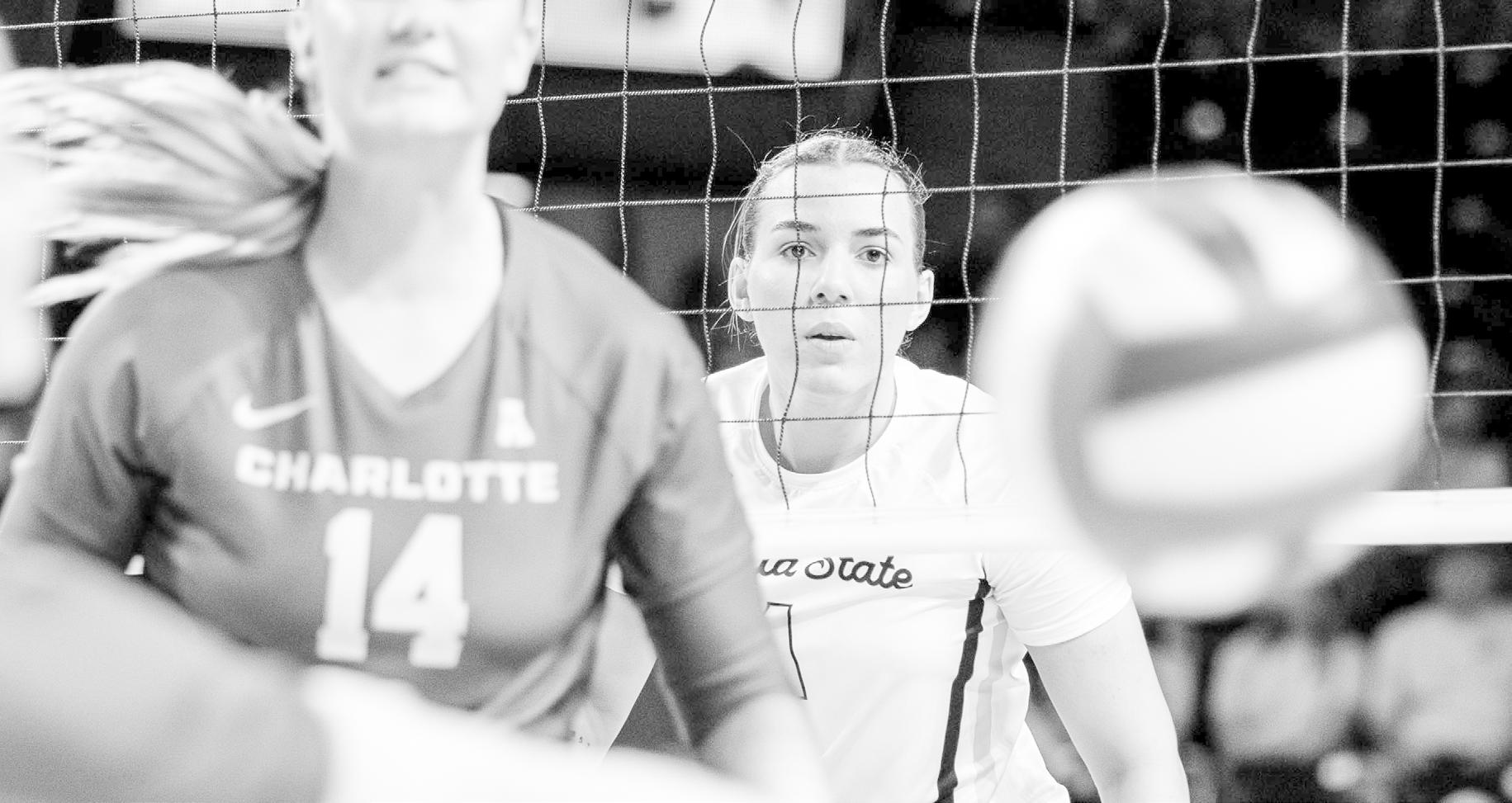
“I came here to visit, and I knew right away that I wanted to come back,” Koehler said. “I saw all of the potential that the program has and the coach’s
report. It was a great fit for me.”
During the transfer process, Koehler experienced challenges before getting to where she is today. She said the challenges are what built her character.
“I had (to) face challenges that I was not used to,” Koehler said. “It’s fun to be myself and see that I am getting (through) things I have never passed through.”
Sophomore outside hitter Emerson Wilford works closely with Koehler during practice and gameplay. She said Koehler aids the team with her unique tactics and has grown to be a leader as well as a strong communicator.
“She hits a lot harder, she attacks (with) high hands, and she powers through blocks, which is a lot different than you see (with) a lot of regular, U.S. players,” Wilford said.
Lamb said he values
Koehler’s kind personality and love for volleyball overall. He said she has a competitive spirit that would benefit all of the players if they can take that trait from her.
“She kind of represents all things good,” Lamb said. “I’m really, really, really going to enjoy my time with her because she’s wired right.”
Lamb has taken note of Koehler’s hard work in creating the starting lineup. He hopes that she integrates well, assimilates and enjoys the ride.
“She’s been putting a lot on her shoulders every single time she plays,” Lamb said.
Wichita State volleyball will be back in action at Moody Coliseum in Texas, facing off against Southern Methodist University on Sept. 29 at 7 p.m.
“Our students are able to build the skills that they are going to use later in life outside of rowing,” Le said.
Between early morning practices and competitions all over the nation, the rowing team makes sure to leave time for team bonding and recreation outside of the water. Wetta described another initiative taken to increase the team’s retention rate between the fall and spring and strengthen the team.
“Our returning women started a big-little program with our novices,” Wetta said. “So all of our returning women got to pick one or two of the novice women to be their ‘little’ for the year, so if they have any questions or they want a study partner, that’s someone that they can look forward to so they don’t feel like they’re in the corner.”
Another activity the teams do is a costume event where the different academic years dress up according to their chosen theme and race against each other.
Read the rest at thesunflower.com.
Sept. 28, 2023 | 7 www.thesunflower.com SPORTS
Members of the rowing team row on Aug. 30. | Photo by Cheyanne Tull / The Sunflower
Barabara Koehler watches as Charlotte recieves her hit. Koehler scored nine kills in the three sets played. |
Photo by Kristy Mace / The Sunflower
‘A different
my
Camryn Compton stands in the batters box during the second game of the KU doubleheader on Sept. 24. | Photo by Kristy Mace / The Sunflower
Rowing team captains begin new era of leadership
Two Hands Corn Dogs adds trendy eats to campus
Jacinda Hall
Recently opened, The Appetite is the definition of a hidden gem, holein-the wall restaurant.
When I say hole in the wall, I mean it. This restaurant has very little signage indicating its location. At suite 500 off Hillside, The Appetite’s door is not facing towards the parking lot, but to the side. If you are driving from the other direction, you could easily miss it.
The ambiance of The Appetite could use some improvement. The seating is very old and looks disorganized. But they do have a few cool pieces of art, and while I was there, they played jazz and lo-fi.
For an appetizer, I tried the fried pickles. I ordered the Italian grinder burger, a patty of Italian sausage and other meat on garlic bread, with parmesan fries. I also tried the mad cow burger with spicy fries, which notably had spicy mayo and jalapeños.
Starting with the appetizer, I could tell the pickles were made fresh because they were super hot and tasted better than any other restaurant's fried pickles I’ve had. The Italian grinder burger had amazing meat. I don’t know what kind of sausage and other meats they mixed in this, but it was some of the best ground meat I’ve ever had. As for the garlic bread as buns, personally, I would have preferred normal buns, but on their own, I think the garlic bread with marinara would be a great side if this were an Italian restaurant.
The “mad cow” burger was recommended by the chef and, I gotta say, I loved it. It was such an original burger that you could taste every little ingredient without being overwhelmed. The drinks selection was very minimal, with the restaurant only serving canned drinks. I got a grape soda and lemonade.
There were lots of other things on the menu like wings and mac 'n cheese, which were sold out when I went. I would definitely go back and try more things off this menu, but burgers seem to be the chef's specialty.
The restaurant also has a furious cow challenge where you have to eat a super spicy burger within six minutes and not drink anything for eight minutes afterward. If you complete the challenge, you get a t-shirt as a reward. They also do a customer of the month competition where you put your name in a jar and you can earn a discount at the restaurant for the entire month.
I hope this restaurant does well because the chef is talented and creative. There are a few things they can improve to make the experience better, but the most important thing about a restaurant is good food, which The Appetite excels in.
Suman
BY CHEYANNE TULL earth2chey.info@gmail.com
Interfest brings international cuisine to campus
BY MAEGAN VINCENT maegan.ann.vincent@gmail.com
On late Wednesday morning, the smell of international cuisine filled the lawn outside the Rhatigan Student Center, bringing in students, staff, and faculty all around campus.
Wichita State’s International Student Union hosted its biannual ‘InterFest,’ the International Food Festival, in front of the Grace Memorial Chapel.

Around 13 different vendors offered signature dishes from various countries, including Paraguay, Iran, Japan and Nigeria. The event gave attendees the opportunity to revisit their favorite cuisines as well as try new dishes from different corners of the world.
Chinonyelum Archie, a Nigerian native pursuing a
Bhandary:
Suman Bhandary, a graduate with a master’s in Typeface Design from the University of Reading, United Kingdom, is the new assistant educator of graphic design at Wichita State University. He will work alongside director and professor of graphic design Jeff Pulaski and assistant professors of graphic design Irma Puškarević and Joshua Smith.
“I became connected with Jeff and Irma, we discussed needing a person like me for this department,” Bhandary said. “My core expertise lies in typography, type design, printmaking and graphic design.”

Bhandary was also a recipient of the prestigious Charles Wallace India Trust Scholarship as he pursued his master’s.
“It is probably one of the major milestones that changed me as a professional and as a student,” Bhandary said. “This scholarship changed my life a great deal. I could actually think about a Ph.D. and plan on applying soon.”
Bhandary has worked as a typeface designer and typographer for 10 years. He began his career in advertising, and then worked independently for Google.
master’s degree in creative writing and a member of the African and Caribbean Student Association, served jollof rice, a traditional West African dish.

“Typically, it’s just rice and Nigerian spices with tomato,” Archie said. “And then I added some carrots and green pepper.”
This year, Sigma Lambda Beta, the Latino-based fraternity on campus, partnered with local restaurant Paleteria La Reyna to sell paletas, a Mexican ice pop.
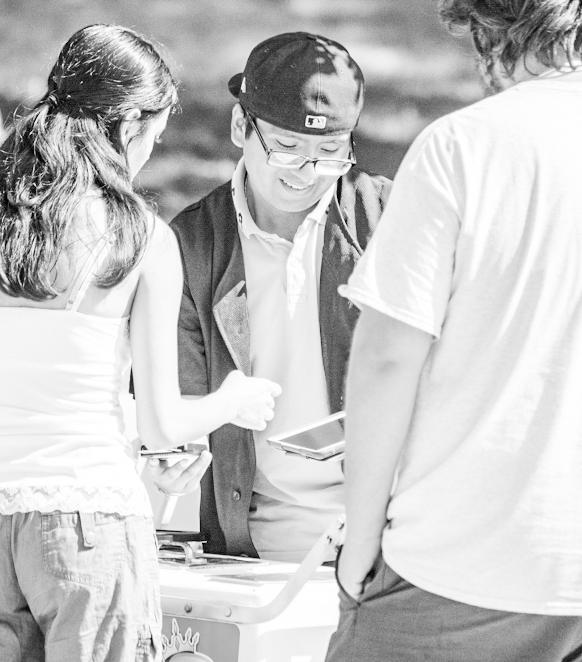
“We pretty much just want to fund our philanthropies,” Gilberto Aguilera, a member of Sigma Lambda Beta, said. “Hopefully, we can use these proceeds for our Dreamers Scholarship.”
Students Randall D’cruz and Pavan Nalukurthi joined the festivities to serve traditional
Indian food.
“We just wanted to make it,” Nalukurthi said. “I just like cooking.”
While the two were not affiliated with a specific student organization at the event, they put time and effort into sharing their country’s cuisine with students. Randall D’cruz said they spent all night cooking.
“We’re only running on, like, 30 minutes of sleep,” D’cruz said, “but we’re having a good time.”
Pam Jerome and Aimee Leisy, intensive English educators on campus, are seasoned regulars of the food festival.
“We come every year,” Leisy said. “We love this event. We work with international students, and we always try to support (them).”
The Korean corn dog trend has officially made its way to Wichita State as students have another option for lunch, dinner or a savory treat to enjoy.
Two Hands Corn Dogs is the most recent restaurant to open in Braeburn Square. They are a graband-go restaurant that serves Korean corn dogs and other types of street food such as elote. Two Hands also serves slushes and sodas.
Two Hands is the second Korean corn dog restaurant to open in Wichita, with the first being Mochinut.
While bearing striking similarities, Korean-style corn dogs and American corn dogs have several differences.
On the outside, Korean corn dogs are made with rice flour and are coated in breadcrumbs, which makes them crunchy. They can also have a variety of toppings, such as Hot Cheetos and potato cubes, and can have a variety of fillings on the inside, like cheese, sausage or both.
I went to Two Hands and tried their “Spicy Dog,” a Korean corn dog topped with Flamin’ Hot Cheetos powder and their signature spicy sauce as well as their horchata slush.
Their Spicy Dog is by far one of my favorites I’ve had from there so far. I am a fan of Hot Cheetos, so I was excited to see that they had an option with this topping.
I liked how well the flavors of the cheeses blended with the crunchiness and spiciness of the corn dog as well.
Their horchata slush on the side added the perfect sweetness to the corn dog, as it was a mix of sweet and spicy flavors.
One thing I appreciated about Two Hands is the variety of fillings you can get with their corn dogs.
They offer seven different filling options as of right now — from the classic half cheese, half sausage to plant-based sausage. According to their website, they will also be adding a plant-based mozzarella in the near future.
Another plus about Two Hands is the affordability. The prices of their corn dogs range from $3.49 to $4.99 before tax. You also have the option to get a box set of three corn dogs for $13.99, or you can get a combo meal of one corn dog, a side and a drink for $9.99.
My favorite thing about Two Hands is the convenience. For college students, the restaurant is a somewhat brisk walk, making it a must to stop by during class breaks.
If you have not tried Two Hands Corn Dogs yet, swing by Braeburn Square and give them a try.
Google font creator becomes assistant educator
After receiving his master’s in 2018 and getting out of advertising, he realized his calling was to teach. Bhandary taught for around four years prior to accepting a position at WSU.
“The bug hit me in terms of my eagerness to teach,” Bhandary said.
“While I was going through the MA program, I did a few workshops with students, and I felt connected to them instantly.”
Bhandary was also a recipient of the prestigious Charles Wallace India Trust Scholarship as he pursued his master’s.
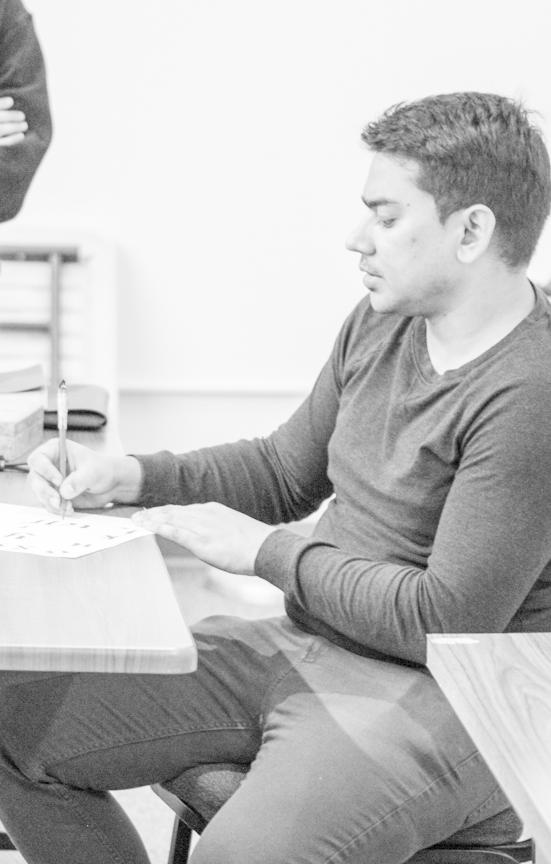
“It is probably one of the major milestones that changed me as a professional and as a student,”
Bhandary said. “This scholarship changed my life a great deal. I could actually think about a Ph.D. and plan on applying soon.
Bhandary discovered graphic design in art school, despite the fact that he was not studying the subject at the time. He always beautified writing for his peers in school and was surrounded and intrigued by letterforms growing up.
“When I joined advertising as my first professional career, I got exposed to letterforms in a much wider span,” Bhandary said. “To a great extent, that started pushing me towards typography and type design.”
Letterforms are the shapes of letters. Letterforms are stored in groups called typefaces, which are further grouped into fonts.
Bhandary assisted Google as an untrained type designer. He attended a workshop in Mumbai, India, where he became connected with supervisors and shared some of his work. Through communication chains, he was given the opportunity to design a new font in the Bengali script.

“It was learning on the job kind of a process, where I was very fortunate to collaborate with people all around the world, not necessarily knowing the language,” Bhandary said. “It was an outstanding sort of experience.”
After that project, he worked on a larger project handling four scripts: Devanagari, the Hindu official language; Odiya, which is another regional language on the eastern side of India; Bengali, which is his mother tongue; and Latin.
“It is very exciting for me to be able to come from a region which is as diverse as India,” Bhandary said.
“Where sort of a lot of scripts are spoken and used. That allowed me to diversify my approach towards type design as well.”
8 | Sept. 28, 2023 www.thesunflower.com HAVE A STORY IDEA? Contact the Arts editor, Salsabila Attaria arts@thesunflower.com
ARTS & CULTURE
Suman Bhandary, the new assistant educator of Graphic Design, gives a demonstration of calligraphy in Typography 2 on Sept. 20. This is Bhandary’s second week of teaching at Wichita State University. | Photo by Cheyanne Tull/ The Sunflower
REVIEW
Victor DiMartino vvjjdd@yahoo.com
REVIEW
podcast@thesunflower.com
Gilberto Aguilera sells paletas at InterFest. Sigma Lambda Beta partnered with local restaurant Paleteria La Reyna to raise funds for the fraternity. | Photos by Maegan Vincent / The Sunflower
Hole-in-the-wall with a creative menu that you need to try
Students from the Vietnamese Student Association serve crab rangoon, flan, and taro milk tea on Sept. 27 at InterFest.
Nigerian-native Chinonyelum Archie, a member of the African and Caribbean Student Association, made homemade jollof rice, a Nigerian cuisine.
Tyler Guthrie tylerguthrie2022@gmail.com
We can all remember back when we were children, where we were taught that recycling plastics is beneficial for a healthier lifestyle and for a greener Earth. However, in recent years in towns and cities like Wichita, recycling became less and less prevalent. This is because present-day recycling deals mostly with plastics, and plastics are not as beneficial for the environment.
National Public Radio explains in a 2020 investigative report that industrialists have misled the public about plastics since the 1970s and 1980s. They have personal reports and dossiers from those times detailing that recycling plastics isn’t and can’t be economically advantageous.
The argument against Chick-fil-A

I don’t care what you do. I don’t care if you eat Chick-fil-A. I don’t care if you shop on Shein. I don’t care if you wear leather. I don’t care if you listen to Kanye. But I think that you should care about what you do and how your choices impact the world.
I’m not going to delude myself into thinking that everyone who eats Chick-fil-A is homophobic. However, if you eat Chick-fil-A while believing you’ve done all you can for the queer community, whether you’re a member of the LGBTQ+ community or not, it’s very important to me that you know you’re wrong.
Let me start this by saying, assuming you do care about advocating for marginalized communities, I hope you look at your purchases in a new light and are willing to accept the weight of your decisions.
Chick-fil-A is good. Really good. I think we can all agree on that, so I’m not going to pretend that their chicken isn’t one of the greatest – if not the best – on the market.
In the same way that their chicken sandwiches are really good, Shein clothing is really
cheap. Kanye has released one or two (three, max) really good songs. I wear leather boots (then again, I’m not vegan). But Shein is, all-around, terrible when it comes to clothing quality, working conditions and its overall impact on the environment. Kanye holds too many prejudices to list. And we all know where leather comes from (if you’re confused, just look at the Chick-fil-A mascot).
In the same way that wearing clothes from Shein while you listen to Kanye’s “Donda” isn’t the most mindful choice, eating at Chick-fil-A isn’t either. Chick-fil-A has been known to not only create an unsafe environment for queer workers but also has been financially supportive of homophobic charities.
A lot of people probably haven’t worked in a place where you felt genuinely afraid of being outed as LGBTQ+. A lot of people probably haven’t met anyone that has been to conversion therapy (a harmful and pseudoscientific form of “counseling,” often religious in nature, that pressures individuals to change themselves to become straight or cisgender).
A lot of people with no personal experience with these issues probably consider themselves allies to the LGBTQ+ communities and hold empathy for those that are impacted by these factors – and
continue to eat at Chick-fil-A. If you do eat Chick-fil-A, even if you identify as LGBTQ+, have you been to conversion therapy? Do you financially support queer causes to curb your funding of Chick-fil-A?
Since the landmark ruling of Bostock v. Clayton Country in 2020, queer people living in states without explicit protection over sexual orientation can no longer be fired on the basis of sexual orientation or gender identity.
According to the official case syllabus, “Clayton County, Georgia, fired Gerald Bostock for conduct ‘unbecoming’ a county employee shortly after he began participating in a gay recreational softball league.”
Circumstances like this one are not far from “eating mor chikin.” Chick-fil-A is one of many businesses to reportedly have discriminated against workers on the basis of sexual orientation in the workplace.
More than that, though, Chickfil-A and its owner Dan Cathy have been unabashedly supportive of anti-gay causes in the past. While the corporation stopped endorsing and financially supporting these causes in 2019, Cathy still does.
“To say that Cathy isn’t Chickfil-a and that Chick-fil-a isn’t Cathy is asinine,” The Esquire’s Justin Kirkland said.
But, chances are, you already know this. And chances are, you’ve still been eating their food, maybe even claiming that “the chicken is so good it’s worth it.” Maybe you think that, since you’re bisexual, it “cancels out” with supporting the company. This is a horrible and selfish mindset. When you support Chickfil-A, you support former CEO Dan Cathy and you support everything he stands for, even without his anti-gay beliefs. Not eating at Chick-fil-A is quite literally the least you can do to support the LGBTQ+ community, and yet it is the easiest choice – or lack thereof – to make.
Sure, Dan Cathy isn’t a complete supervillain (setting my personal opinion on him aside). And Chick-fil-A has, in fact, stopped donating directly to homophobic causes. But this is the bare minimum to repair the damage that has been done, and you need to consider where the profits from your chicken sandwich and waffle fries go.
Chances are, this writing isn’t going to change your mind. If you eat Chick-fil-A, you’re probably going to keep eating it. But all I’m asking is that you think about what you’re supporting, and whether you think having a good meal – a damn good meal – is worth the harm you’re causing others.
LETTER TO THE EDITOR
These reports specify how recycling plastics is actually expensive and it would be cheaper to mold new plastics from scratch. Since plastics are molded from petroleum-based products, when oil prices fluctuate, so do plastic prices.
In a downhill market, plastics become even more valuable and the cost of manufacturing and distribution skyrockets. These numbers are crucial since plastics are used daily in practically every product.
Any recycled plastic product is not as robustly remolded as a newly molded plastic. In the recycling process, plastic degrades. It becomes less and less valuable and the product more and more worthless to use with every recycling revolution. Usually, one or two recycled products is the end for the plastic before complete degradation.
Recycling centers either go out of business or ship their recycling waste to landfills. Some places even send it out to the oceans, which pollutes sea creatures’ homes.
These animals are either killed by the debris or consume it. Then, in turn, these animals are hunted and sold in markets and stores with the debased plastics in their bloodstreams.
Like a recycling revolution, when we throw our plastics in the recycling bin, they will most likely come back to us in a new way and form.
In the end, focusing energy on recycling resources like aluminum will be far more beneficial for everyone’s wallets and the planet, for Wichita and around the world.
How Bing and ChatGPT can undermine intellectual growth, autonomy
This op-ed letter addresses a matter of great concern that has come to my attention recently. With the advent of AI applications like Bing and ChatGPT, I have observed an immediate significant decline in the thoughtfulness, detail and appropriateness of the assignments submitted by my students. It is disheartening to note, according to multiple surveys, that a large chunk of college students nationwide are now turning in AI-generated assignments, and I suspect that some of my students may be tempted to do the same.
I implore all WSU students to resist this temptation. Your university education is a journey of growth, much like a physical workout strengthens your body. Effort and intellectual struggle not only make you wiser but also smarter, as they stimulate new networks in your brain.
Reading complex texts and drawing your own conclusions are essential exercises for your intellectual strength and freedom. Using AI-generated intellectual work is
akin to submitting an AI-generated video of yourself working out to your coach instead of actually putting in the effort. It defeats the purpose of being on the team if you’re not willing to do the work.
I am deeply concerned about the predictions that using AI-generated work as a substitute for human reading, thinking, and writing will make people less capable of critical thinking and creativity, making them more easily exploited as workers and citizens.
In light of this concern, I have made the decision to stop awarding partial credit for vague, undetailed, partially correct answers that minimally define answers “as typed,” in a way that Google or AI would answer without thoughtful engagement with how the terms and concepts are actually used in our readings.
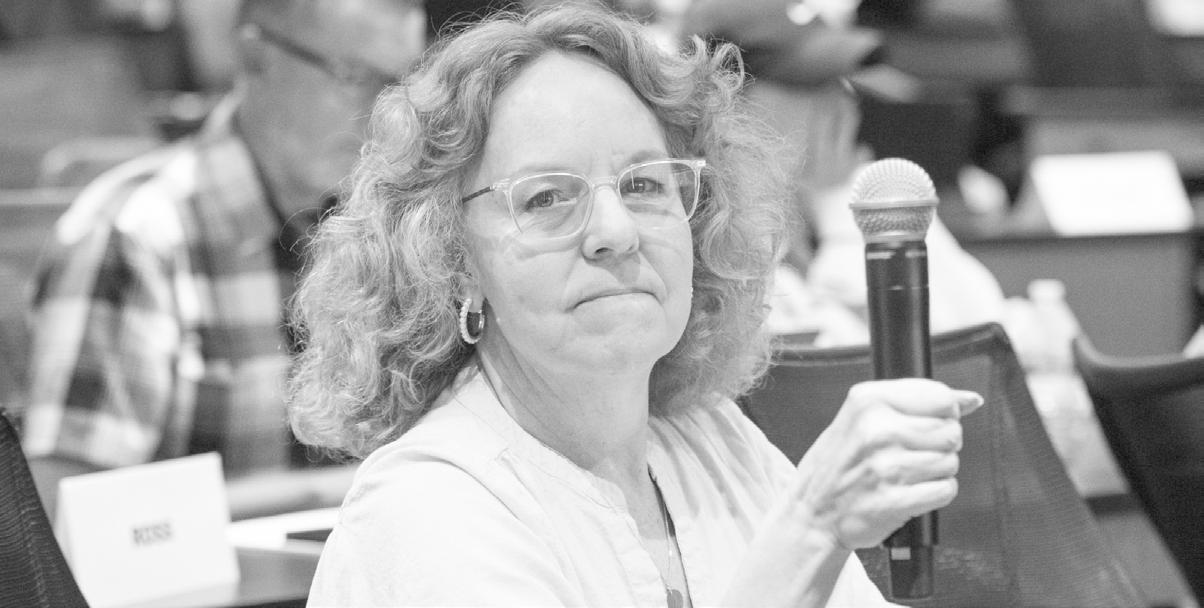


I have assigned readings such as my own book chapters and highly specialized philosophical essays that Bing or ChatGPT cannot adequately respond to or provide accurate information on. Bing or ChatGPT have not and cannot read
these texts. These applications draw from a vast store of partially accurate, most “average” and uncontroversial texts online. Furthermore, there are filters against creativity, criticality and controversy in Bing and ChatGPT.
More importantly, I want you, or WSU students, to desire wisdom and increased intelligence. I want you to be wary of a world where the ability to read critically and think creatively is diminished by proprietary AI software.
To further emphasize the importance of this matter, I would like to share some insights from an article titled “Artificial Intelligence: 7 Things College Students Need to Know Before Using AI.”
“1. It’s still plagiarism: Using AI may not be the same as taking credit for someone else’s work, but it still constitutes cheating. Passing off work that you did not complete on your own can have severe consequences in academia.”
“2. AI is not reliable: AI can fabricate information when it cannot find an answer or is asked
to complete a task it doesn’t understand. It is crucial to differentiate between actual facts, sources, quotes, etc., related to your course material and those that are fabricated.”
“3. Robots aren’t smarter than people: While AI is fast and proficient in grammar and sentence structure, it lacks consciousness and understanding. It cannot evaluate, make connections, empathize, or think critically like humans can.”
In conclusion, I urge you to embrace the challenges of your
education and resist the allure of AI shortcuts. Your growth as critical thinkers and intellectuals is paramount, and your professors are committed to supporting your journey.
Let us work together to ensure that your university experience truly enhances your wisdom and intelligence.
SUBMITTED BY ELIZABETH HEILMAN, EDUCATION PROFESSOR elizabeth.heilman@wichita.edu
OPINION Sept. 28, 2023 | 9 www.thesunflower.com HAVE A STORY IDEA? Contact the Opinion editor, Sascha Harvey opinion@thesunflower.com
OPINION
Recycling plastics has always been inconvenient
‘Not eating at Chick-fil-A is quite literally the least you can do to support the LGBTQ+ community, and yet it is the easiest choice – or lack thereof – to make.’
Sascha Harvey opinion@thesunflower.com OPINION
Illustration by Wren Johnson / The Sunflower
Education professor Elizabeth Heilman prepares to speak to the Faculty Senate on Sept. 25. | Photo by Mia Hennen / The Sunflower
LIFE IN THE RSC
From tie-dye to Care Bears, a variety of events took place in the Rhatigan Student Center on Sept. 21, giving students the chance to walk through campus and have their pick.
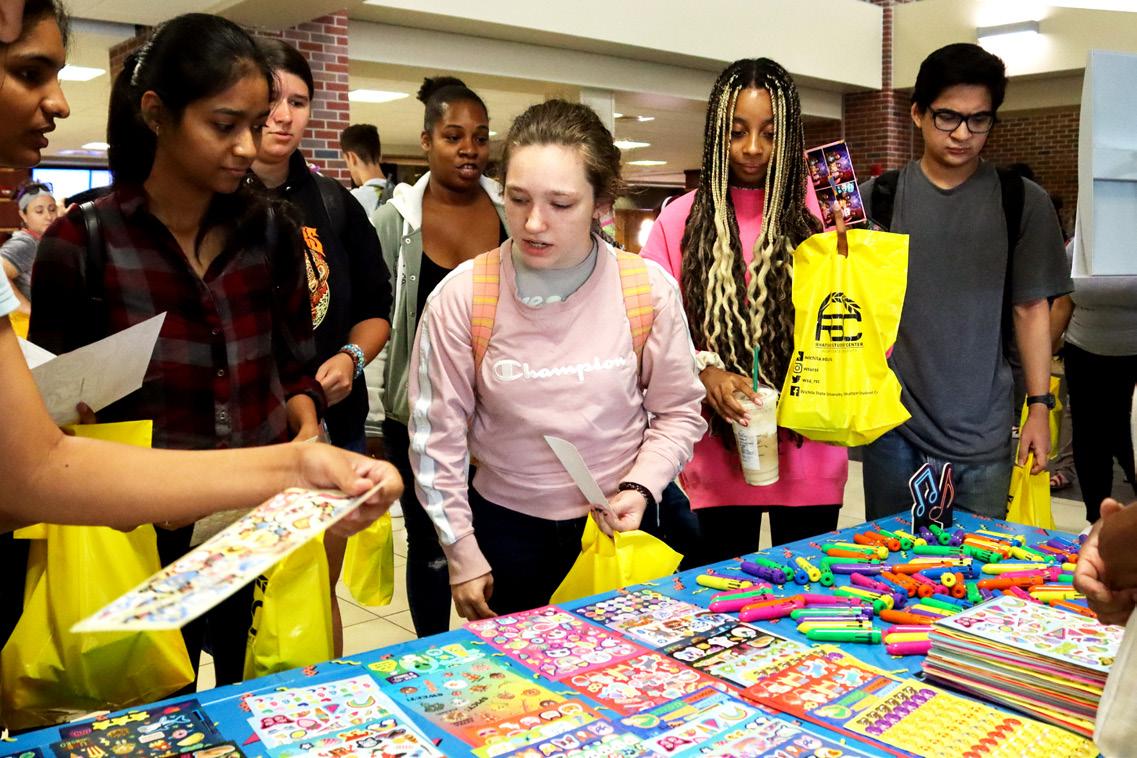
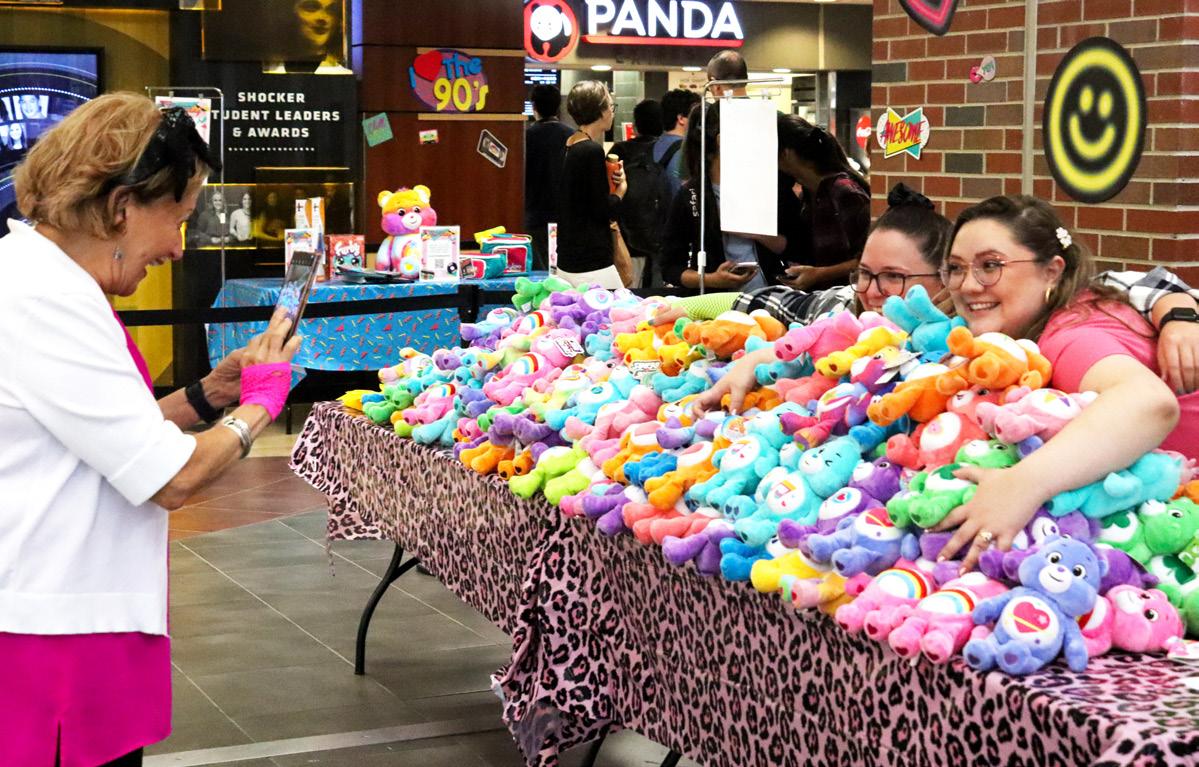
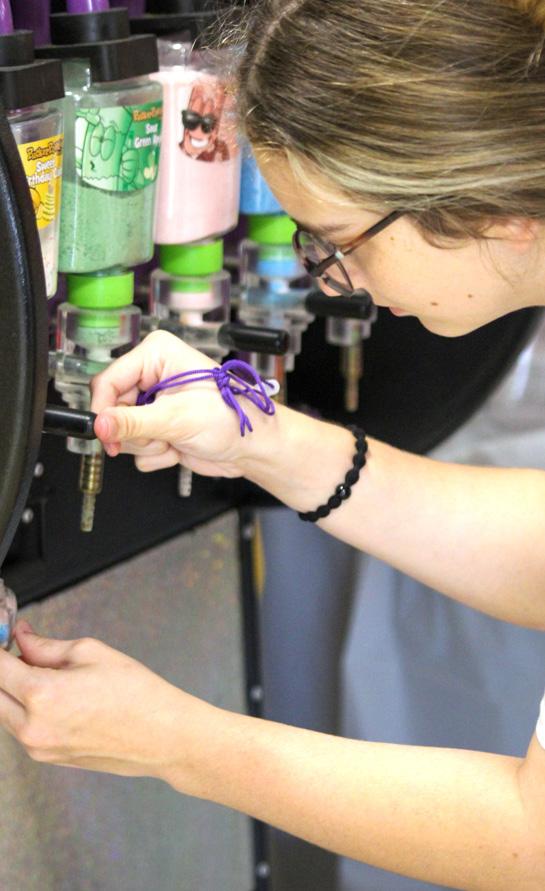

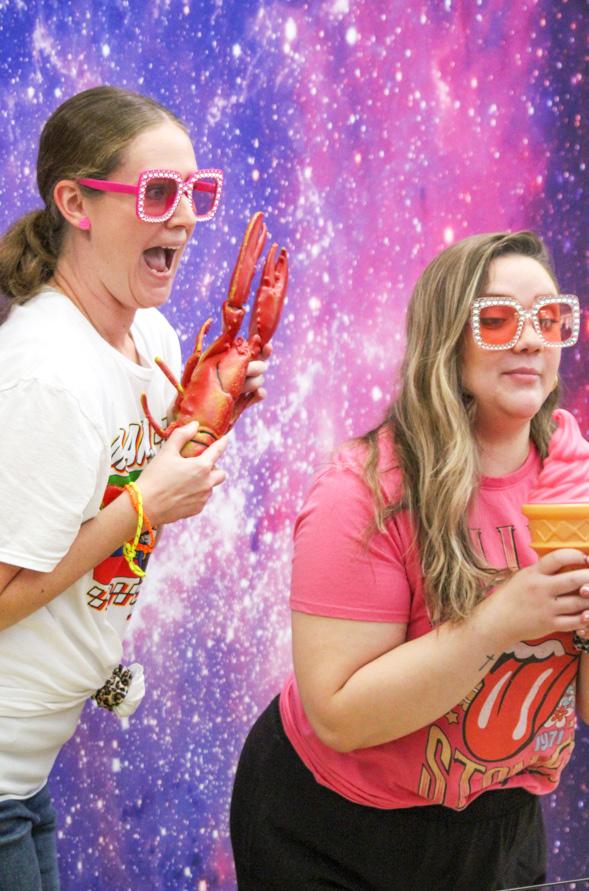
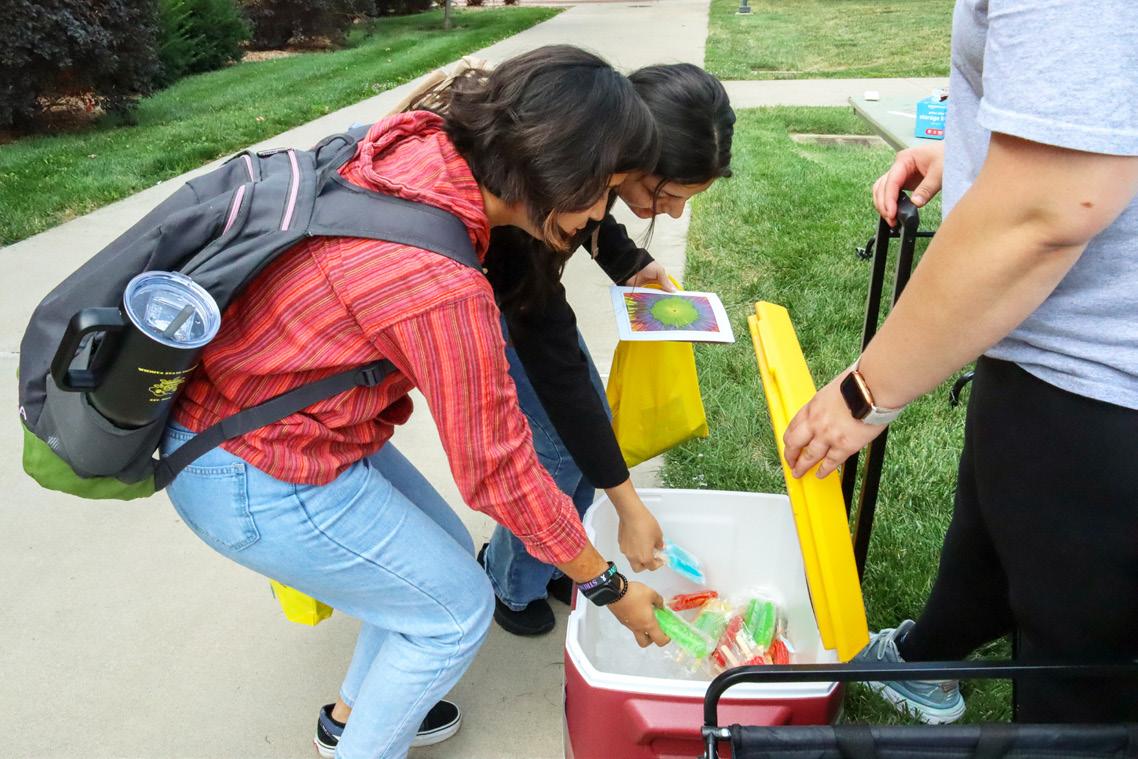

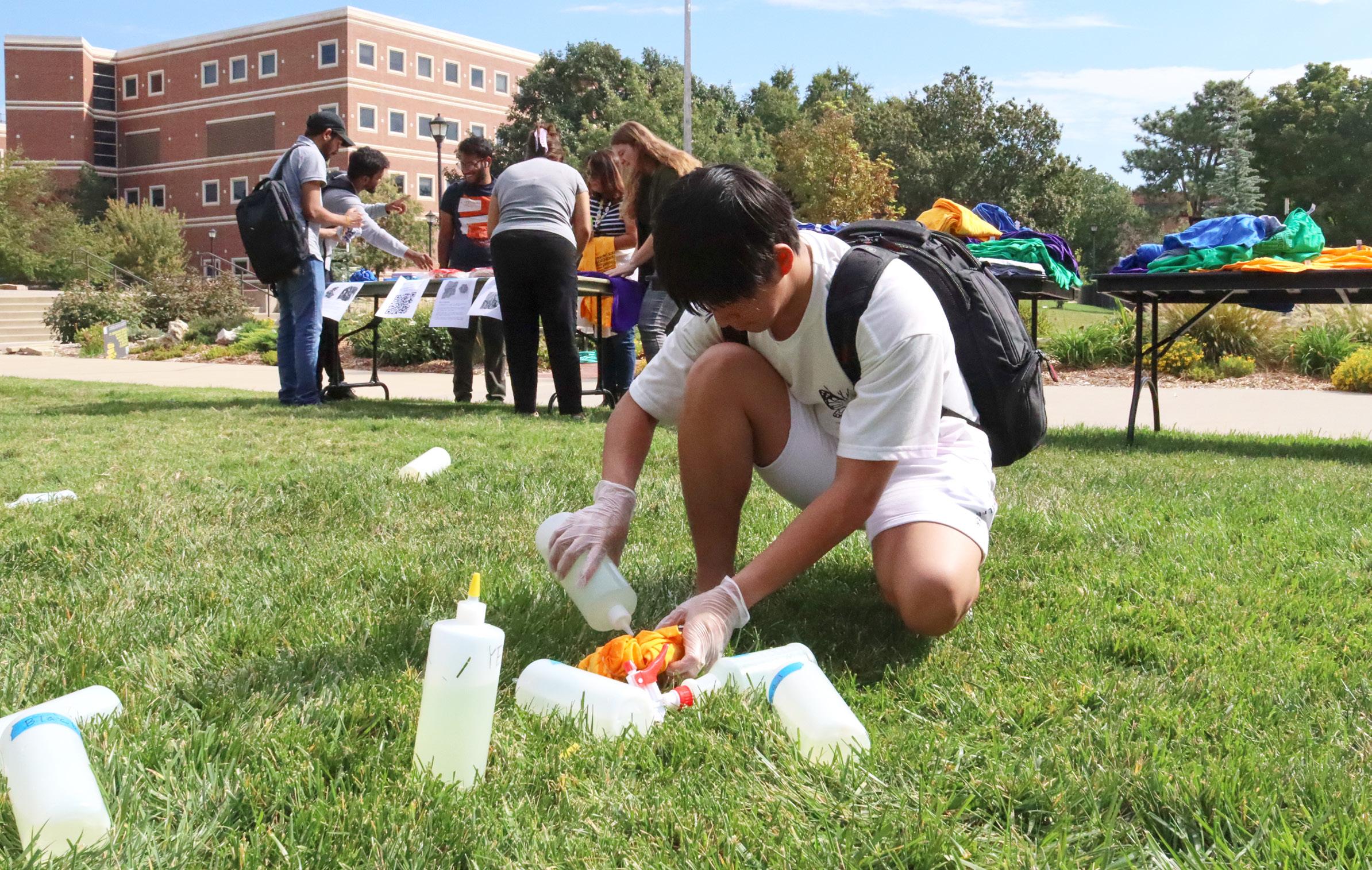
UPCOMING EVENTS
ACADEMIC CONVOCATION
THURSDAY, SEPT. 28
9:30 - 11:30 a.m. | Wilner Auditorium
CIRCLE OF SISTERHOOD
WEEK: BEANIE FUNDRAISER
THURSDAY, SEPT. 28
11 a.m. - 2 p.m. | Rhatigan Student Center
SAFETY WEEK: NARCAN TRAINING
THURSDAY, SEPT. 28
11 a.m. - Noon | Rhatigan Student Center
TEACHING MATTERS SERIES: CREATING CONNECTIONS WITH AND AMONG YOUR STUDENTS
THURSDAY, SEPT. 28
Noon - 1 p.m. | Rhatigan Student Center
VOICES FROM THE VAULT | THE 2010S: CHAZ GUEST
THURSDAY, SEPT. 28
5:30 - 7 p.m. | Ulrich Museum
IGNITOR 1.0: IGNITE YOUR STARTUP JOURNEY
THURSDAY, SEPT. 28
5:45 - 8 p.m. | Devlin Hall
BLUES CLUES SCAVENGER HUNT
THURSDAY, SEPT. 28
6 - 7:30 p.m. | Rhatigan Student Center
SAFETY WEEK: SELF DEFENSE CLASS
THURSDAY, SEPT. 28
6 - 7:30 p.m. | Heskett Center
WSU JAZZ ENSEMBLES - JEFF
DENSON/ROMAIN PILON TRIO
FEAT. MARK FERBER
THURSDAY, SEPT. 28
7:30 p.m. | Odd Fellow Hall
WSU’S FRENCH DIVISION HOSTS FRENCH IMMERSION DAY
FRIDAY, SEPT. 29
9 a.m. - 2 p.m. | Jardine Hall
CAMPUSWIDE QUARTERLY
E-WASTE & SHREDDING EVENT
FRIDAY, SEPT. 29
11 a.m. - 1 p.m. | NetApp
ENGAGING LEADERS
FRIDAY, SEPT. 29
3 - 4 p.m. | Boys and Girls Club of South Central Kansas

LECTURE SERIES IN THE MATHEMATICAL SCIENCES: DR. JIAPING WANG, UNIVERSITY OF MINNESOTA
FRIDAY, SEPT. 29
3 p.m. | Jabara Hall
AUX CORD WARS LIVE: MUSIC TRIVIA
FRIDAY, SEPT. 29
8 - 10 p.m. | Rhatigan Student Center
GOOD NEIGHBORS CARE INITIATIVE: SHOCKER NEIGHBORHOOD CLEAN-UP
SATURDAY, SEPT. 30
8 - 11 a.m. | Urban League of Kansas
SUSPENDERS4HOPE 5K AND 1-MILE MEMORIAL WALK BENEFITTING STOPSUICIDEICT
SATURDAY, SEPT. 30
8 - 11 a.m. | Steve Clark YMCA & Student Wellness Center
WICHITA STATE ATHLETICS
GARAGE SALE
SATURDAY, SEPT. 30
8 - 11 a.m. | Charles Koch Arena
SCHOOL OF MUSIC PRESENTS
A GUEST ARTIST RECITAL
SATURDAY, SEPT. 30
7:30 - 9 p.m. | Wiedemann Hall
HAVE AN EVENT YOU WOULD LIKE LISTED?
CONTACT THE ARTS EDITOR: arts@thesunflower.com
CONTACT THE NEWS EDITOR: news@thesunflower.com

10 | Sept. 28, 2023 www.thesunflower.com ARTS & CULTURE
A Wichita State student sits outside the Rhatigan Student Center, pouring different bleach-dyes to make a tie-dye t-shirt. The Office of Strengths, Assessment and Staff Experience offered free materials and shirts while supplies lasted on Sept. 21. |
Photo by Garima Thapa / The Sunflower
A Wichita State student gets their t-shirt ready to bleach dye at the SASE event. |
Photo by Garima Thapa / The Sunflower
Two students gets ice cream at the SASE tie dye event. | Photo by Garima Thapa / The Sunflower
A student fills a plastic container as part of a candy art activity at the RSC’s Throwback Thursday event. Several stations, including a spin art activity, were offered free of charge to WSU students. | Photo by Cheyanne Tull / The Sunflower
Laura Wilson and Vanessa Bell take photos at the photo booth as the Throwback Thursday event comes to a close on Sept. 21. The pair worked at the Rhatigan and gave out Care Bears and other throwback toys. |
Photo by Cheyanne Tull / The Sunflower
Holly Harris and Laura Wilson pose for a picture with Care Bears that were about to be handed out to students in RSC for the Throwback Thursday event.
| Photo by Garima Thapa / The Sunflower
Wichita State students choose from a variety of stickers and toys at the Throwback Thursday event on Sept. 21. | Photo by Garima Thapa / The Sunflower
At a Kappa Delta Chi sorority fundraiser on Sept. 21, members sold different food items, like tostielotes. | Photo by Garima Thapa / The Sunflower
A Kappa Delta Chi sorority member prepares a tostielote for Wichita State students at the sorority’s fundraiser event on Sept. 21. | Photo by Garima Thapa / The Sunflower

 BY MONIQUE BEVER monibever@gmai.com
BY MONIQUE BEVER monibever@gmai.com













































 BY MELANIE RIVERA-CORTEZ sports@thesunflower.com
BY MELANIE RIVERA-CORTEZ sports@thesunflower.com



 Illustration by Cameryn Davis / The Sunflower
Illustration by Cameryn Davis / The Sunflower






















